Discography Deep Dive #1: Sparks
OR
I listened to every Sparks song
Here’s what happened.
A quick preview; why Sparks? Well, I wanted a band that would be a challenge but also one that would provide different music for my journey through their history. Having watched the documentary, on Netflix, called the Sparks Brothers, I feel adequately prepared to rock.
Album #1: Sparks (Originally called Halfnelson, 1971)
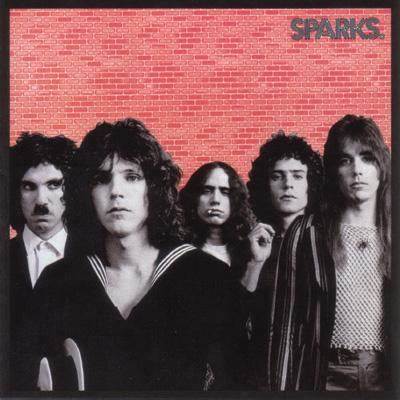
Existing somewhere between art-pop and pop-rock Sparks debut album is a quirky affair. “Wonder Girl” is the opening track. A look at Ron Mael’s appetite for the female of the species but also that he’s some distance away from them. Russ Mael’s vocals are wonderful. ***½. Great start. Track two is “Fa La Fa Lee”. Sparks’ love of upbeat sounds mixed with slightly depressing lyrics already very clearly defined. ***. Solid but disposable pop, ultimately. Track three is “Roger”. This is very weird and experimental, especially with the keyboards. I kind of like the bassline but that’s about it. This is the only song Russell wrote for the debut album, thankfully. *¾. Track four is “High C”. This has a mad catchy riff with little offbeat lyrical moments. Russ has a great voice and it’s barely touched here. It reminds me of Steve Tyler on early Aerosmith records where he sang with a faux English accent instead of demonstrating his vocal range. ***¼. Track five is “Fletcher Honorama”, the third longest song on the album at 4.15. It’s around 30 seconds into the keyboard solo in the middle of this track that I start to regret my decision to do EVERYTHING by Sparks. It picks up towards the finale but then just fades away. Not my bag. **¼. The first half of the debut album concludes with “Simple Ballet”. This is just odd. Like an early 70s jam session that happens to have lyrics. **.
Back in the day, albums came on vinyl so would have two sides. So, we’ve flipped over here with “Slowboat”. This is one of Ron Mael’s tortured soul songs, dedicated to lost love done in the style of a love song. ***½. Next is “Biology 2” penned by Sparks guitarist Earle Mankey. It’s just plain weird. Very experimental. Lots of falsetto vocals and strange words like Homozygous, phenotype and Kalikaks. The bass line is particularly odd. I quite liked it. **¾. “Saccharin and the War” is the second song off the debut LP written by Russell. Musically it just plods along while Russell sings about eye liner and doctors. I have no idea what he’s on about. The band just jams for a minute at the end! **½. Penultimate track is “Big Bands”, which has a huge shift in the middle of the song and is a song about the Wall Street Crash. We conclude album #1 is “(No More) Mr Nice Guys” written by Ron and Sparks bassist Jim Mankey. It has a good bassline coincidentally. It’s also the longest song on the album at nearly six minutes. It’s one of these Ron songs where nice guys, IE him, finish last. ***¼. Solid conclusion to the debut album!
Album #2: A Woofer in Tweeter’s Clothing (1972)
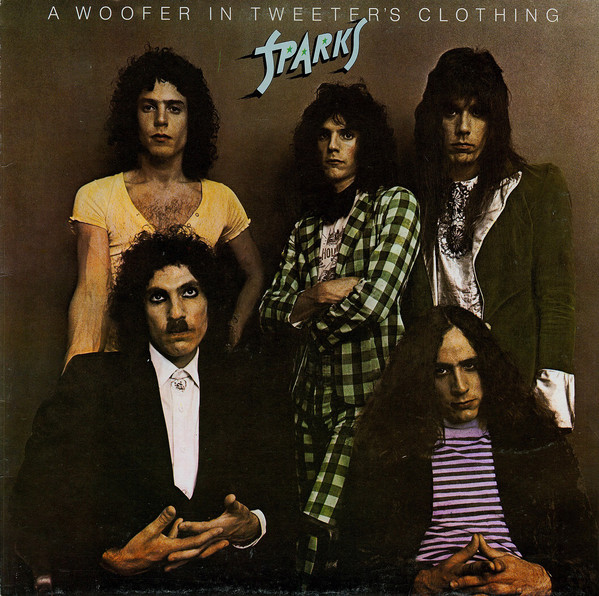
Sparks’ second release quickly followed the first. The opening track was the ‘hit’ single “Girl from Germany”. The chorus is where Russell’s vocals really come in with a slightly off-kilter sound happening on the rest of the track. ***½. Track two, “Beaver O’Lindy” has oom-pah music influences before switching into a high tempo, upbeat, percussion driven deal. The switch to glam rock with an aggressive bass is jarring but it’s a much better song when it switches gears. ***¼. Track three is “Nothing is Sacred”. This is one of those songs Sparks love the repetition on. The title of the track is sung a lot and it rambles on. **½. Track four is “Here Comes Bob”. This is a weird classical mash-up with strings. *¾. Track five is “Moon over Kentucky”. The lyrics on this come from bassist Jim Mankey and he seems down on life. The Mael’s turn it into something borderline operatic with the rich wall of sound backing Russell’s dramatic vocals. ***½.
Flipping over to the other side of the LP, we have track six: “Do-Re-Mi” from the Sound of Music. Only Russell perverts the sounds so they’re not following the traditional format. ***. Track seven is “Angus Desire”. This is a suitably weird mesh of now familiar Sparks’ sounds. ***. Track eight is “Underground”, penned by Earl Mankey, who seems to have fully embraced the weird here. It’s a pleasant enough pop song. **¾. Track nine is “The Louvre”. In keeping with the band’s weird motif, this is mostly in French. Written by Ron Mael and then translated by Josée Becker. It switches to English near the end and includes the lyric “the tourist’s do marvel, they touch my cold marble”. *Chefs kiss*. ***¼. Track ten is “Batteries Not Included”, a 45 second song about buying a toy and discovering the batteries were not included. **. Sparks’ second LP concludes with “Whippings and Apologies”. This might be the most Sparks song so far. A driving rock baseline with weird keyboards and repetitive lyrics. This is the first time I’ve really loved a Sparks song. ****.
Album #3: Kimono My House (1974)
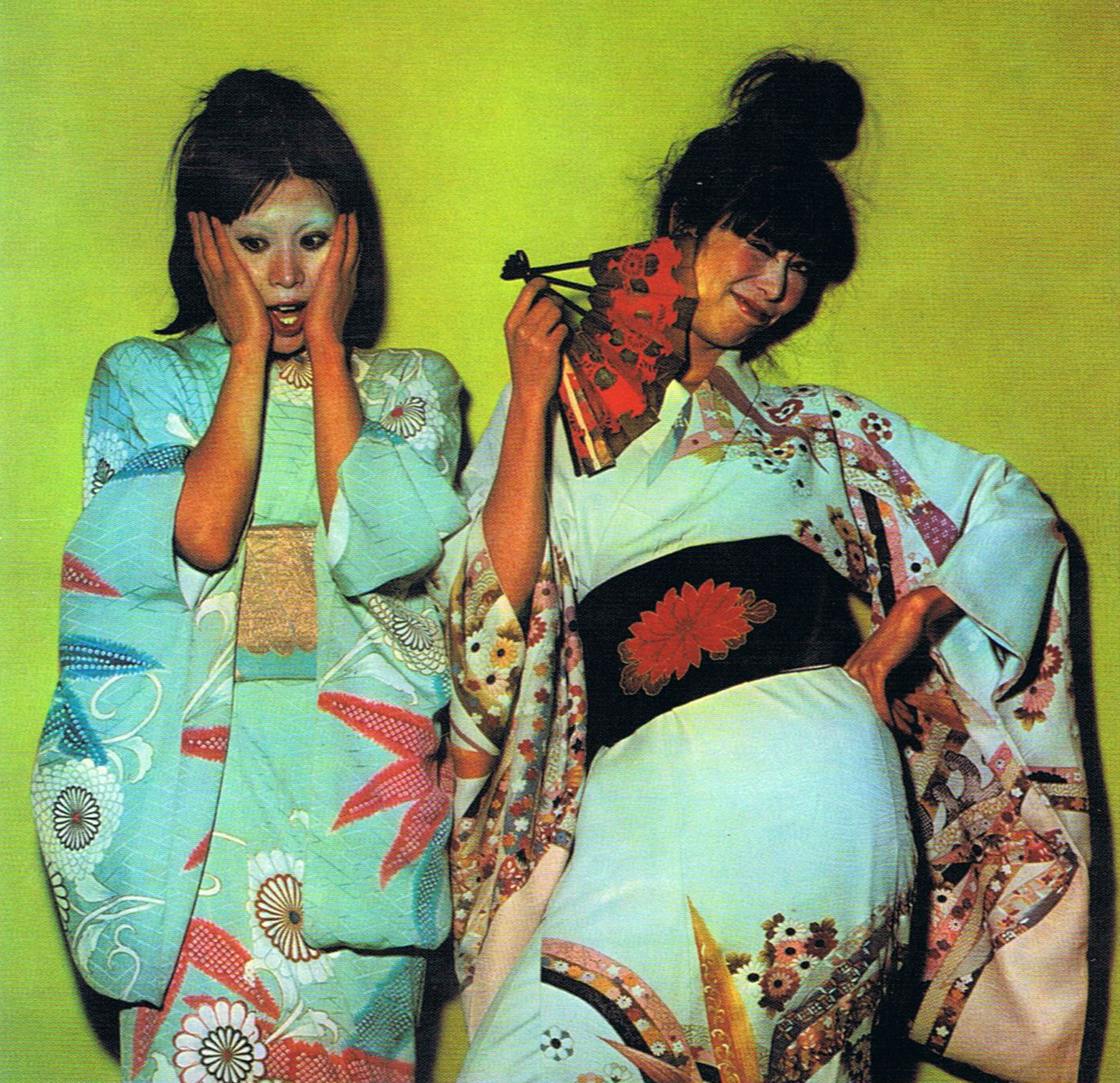
This was Sparks’ commercial breakthrough. Sparks went more glam rock than before and recorded in the UK in the process. The Mankey Brothers and Harley Feinstein were replaced by British musicians Martin Gordon, Adrian Fisher and drummer Dinky Diamond. Track one starts things off in spectacular fashion because it’s “This Town Ain’t Big Enough for Both of Us”, which is probably Sparks most famous song and an all-time great banger with a sensational guitar riff, kooky keyboards and trippy falsetto vocals. It’s the best song they’ve done to this point by a country mile and my initial jumping on point for being a fan of Sparks. *****.
Track two is “Amateur Hour”, which was the second single. Lyrically it’s a sneaky song loaded with filth about sexual experience (“It’s a lot like playing the violin, you cannot start off to be Yehudi Menuhin”). It’s got a driving riff and a cracking chorus. ****¼. Track three is “Falling in Love with Myself Again”. There’s a clear switching of gears here and it’s far less aggressively rocky. ***. Track four is “Here in Heaven”, a song about how dumb Juliet is in Romeo and Juliet. ***¼. Track five is “Thank God It’s Not Christmas”. This comes just after Slade’s “Merry Christmas Everybody” and feels like a reposte to that musical sell out. I could easily let this sneak into my rotation of Christmas music. ***½.
Flipping the disc over reveals side two, starting with track six “Hasta Manana Monsieur”, a language hopping tribute to hipster ladies of Europe. It also has sick screaming guitars. I really like this album. ***½. Track seven is “Talent is an Asset”, one of the kookier offbeat tracks on Kimono My House. It’s a song about Albert Einstein (“talent is an asset and little Albert has it”). It’s insanely catchy. ****. Track eight is “Complaints”, a song about working in the complaints department of a department store. It includes the lyric; “I’ll dive off the mezzanine if one more points at crooked seams”. ***½. Track nine is another slightly off-kilter piece about family trees. ***¼. Final track is “Equator”, which contains more falsetto lyrics than you can poke a stick at. The repetitive nature of the title is very Sparks. It’s a shame the album almost fades away here though, rather than going out with a bang. **¾.
Album #4: Propaganda (1974)
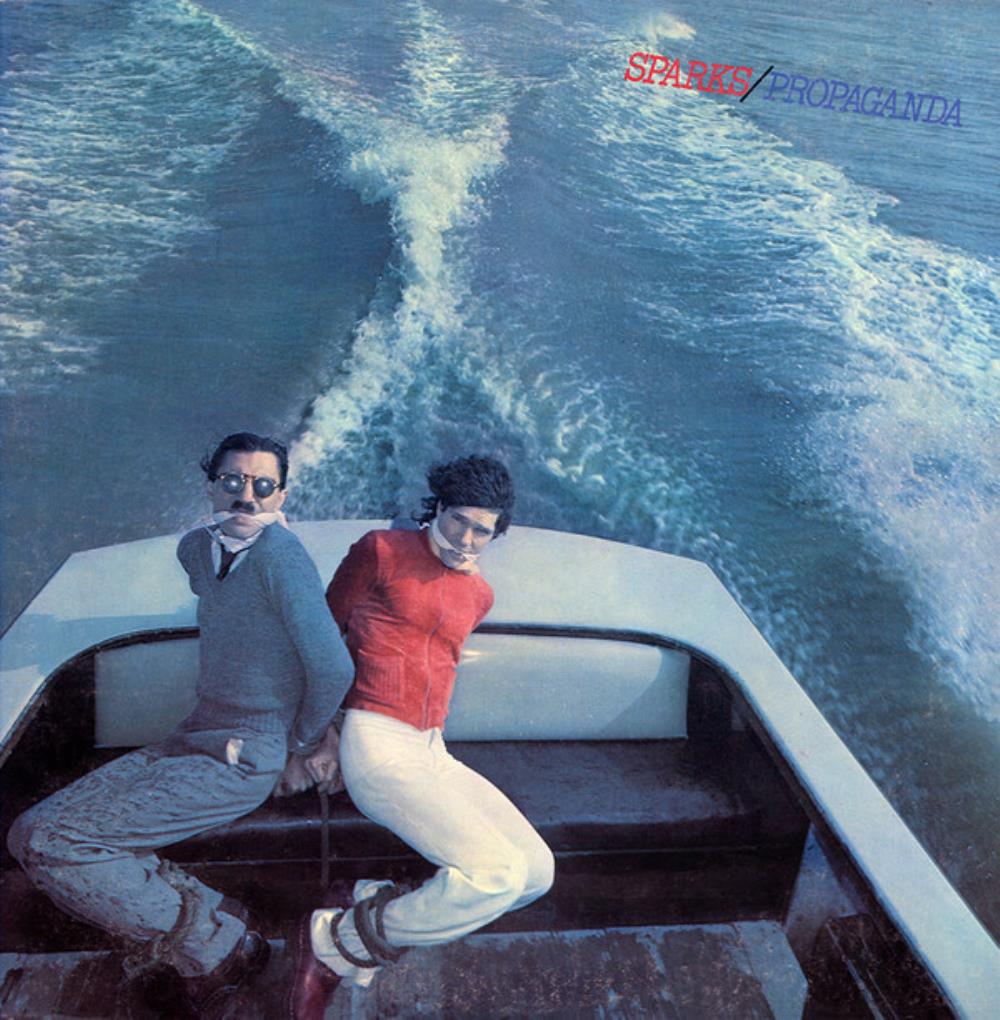
Propaganda came out a mere six months after Kimono My House. Striking while the iron is hot, the band churned out another glam rock album. Their second, and final, with producer Muff Winwood and the second of three recorded with the British line up. On Ranker, Propaganda is Sparks’ highest rated album, just ahead of Kimono My House.
Track one is “Propaganda”, which is a 20 second intro before track two “At Home, at Work, at Play”. ***. Track three is “Reinforcements” is a jaunty little number with a fuzzy glam sound at the core but plinkety plonkety keyboards keeping it suitably off-kilter. The strong repetition on the vocals is very Sparks. ***½. Track four is the high speed “BC” with Russell fronting a series of key changes. I don’t know how he does this shit live. ***¼. Track five is “Thanks But No Thanks” has Sparks eschewing advances from, well, I don’t know. Girls? Record producers? Drug dealers? ***½.
Over to side B we have the main single and track six; “Never Turn Your Back on Mother Earth”. The song builds but never quite crescendos, which is musical cock teasing. I’m waiting for it, and it never comes. Still the building blocks of a banger that unfortunately never quite lands. ***½. Track seven is “Something for the Girl with Everything”, which has a lot of falsetto lyrics and feels like a spiritual successor to “This Town…”. Lyrically it’s very weird but musically it has all the pizzazz and musical highs I was wanting from the single. ****. Track eight is “Achoo”, which includes the lyric “is there any cure for hell”. This never quite lands for me. **½. Track nine is “Who Don’t Like Kids”, a lesson in being normal and how conformity and having a family makes you happy or something. It’s obviously a little underhanded. ***¼. Track ten rounds out the album and it’s “Bon Voyage”, which at almost five minutes, is the longest track on the album. ***
Album #5: Indiscreet (1975)
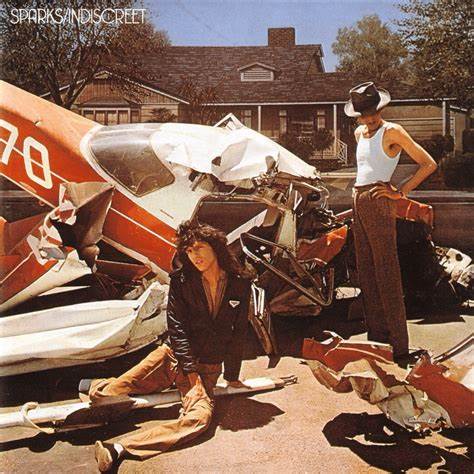
For their third album in the UK, they teamed up with Tony Visconti and was the first real switch in gears for the band. Incorporating different musical styles and moving away from the glam rock scene that had made them, relatively, famous. This is the start of an experimental period where the band looked for a new sound, which they didn’t really connect with until 1979 and a switch to synth-pop and electronica.
Track one is “Hospitality on Parade”. This is a curious choice to open the album as it’s very slow and weird. It’s 2m30s of strange lyrics before the song kicks in properly and the last 1m30s is repetitive and also weird. **½. More weird keyboards on track two; “Happy Hunting Ground”. At least they get into the meat of the song a bit quicker. I’m starting to get worried a lot of Sparks albums aren’t going to land with me and I’ve got 20 more of these to sit through. **¾. Track three is “Without Using Hands” and the heavy use of keyboards continues here. The driving bassline combined with the falsetto vocals is what drew me into Sparks. There’s nothing good about this album. **¼. Track four is “Get in the Swing”, which sounds like something you’d hear in the background at a circus. **½. Track five is “Under the Table with Her”. This goes full on baroque with strings, and you question at this point if they even need a band to play this. The “dinner for twelve is now dinner for ten because I’m under the table with her” is a good lyric but it’s a fucking weird song. ***. Track six, “How Are You Getting Home?” is the most normal sounding track on the first half, with the band returning. There’s percussion! While it’s still odd, it works much better than anything else on the first half. ***½.
Flipping the disc, we have track seven; “Pineapple”, which is a bizarre ode to the fruit of the same name. At least this is suitably bizarre subject matter for the weird sound Sparks have cultivated for this album. ***. Track eight is simply called “Tits”. How do I describe Tits? It’s about drinking culture and not getting laid when you’ve got a family. ***. Track nine is “It Ain’t 1918”, which is some sort of story about a solider called Johnny getting married and moving to St Louis. If it’s a parable for something else I’m not seeing it. **½. Track ten is “The Lady is Lingering”. I think it’s about groupies? It’s a pleasant little ditty. ***¼. Track eleven, “In the Future”, is designed to sound like a clash between baroque and synth. Like Sparks were creating what their future sound should be. ***. Track twelve, “Looks, Looks, Looks”, is a swing song that wouldn’t have sounded out of place in the 40s. ***¼. We close on track thirteen; “Miss the Start, Miss the End”. **½. I can’t remember it.
Indiscreet is certainly an experimental album and it took a while for anything on it to click with me. It’s my least favourite Sparks album so far but I’m looking forward to where the experimenting takes us.
Album #6: Big Beat (1976)
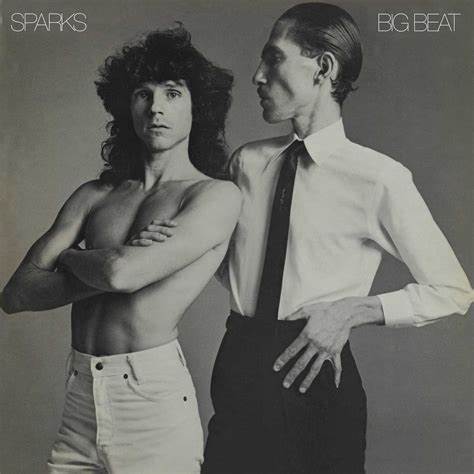
For their sixth album Sparks went back to America, New York City to be precise, to hunt down a new sound. They dumped the British backing band, hired bassist Sal Maida, guitarist Jeffrey Salen and fanboy drummer Hilly Boy Michaels. This album was eventually considered a failure because Sparks thought it was “bereft of personality”.
I love Aerosmith and the 1970s New York sound so, naturally, I like the way this sounds. We kick off with “Big Boy”, which has a satisfying thick dirty backing track, but it doesn’t really mesh with the falsetto vocals. ***. Track two “I Want to be Like Everybody Else” is the same. The vocals and lyrics feel like a different band to the backing track. The lyrical sentiment of this is why they’re attempting this musical experiment but they’re too weird to sound like this. ***. Track three is “Nothing to Do” and this sees Russell tone the vocals down a bit and it fits better with the musical style they’ve aiming for. ***¼. Track four, “I Bought the Mississippi River”, is a bizarre track about buying a major water feature and then realising you can’t do much with it. On this track the backing band are toned down to suit the lyrical weirdness. So, this works too. ***¼. Track five is “Fill-Er-Up” returns to the energetic backing band and falsetto vocals matching weird lyrics about buying petrol. **½. Side one concludes with track six; “Everybody’s Stupid”. This is one of those repetitive songs that the Mael’s are so fond of. This is a laugh, I dig it. ***½.
The second side starts with track seven; “Throw Her Away (And Get a New One)”. I assume this is a social critique of old men dating young girls and not actually what they believe. Nevertheless. *½. Track eight is “Confusion” is about your girlfriend cheating on you and reveals the true lack of masculinity in Sparks’ lyricism. ***. Track nine is “Screwed Up”, an ode to how bad the 1970s are compared to every other decade that preceded it, which slips into lyrics about relationships and eventually Russ just singing “I’m getting on my nerves”. ***¼. Track ten is “White Women”, which is another attempt at social commentary. It feels misguided. *. We conclude with track eleven; “I Like Girls”. This feels like another attempt at making a mainstream song but being far too weird in the process. **.
Big Beat is disappointing. Sparks attempting to make a different sounding album without acknowledging that the core of their sound is Russell’s vocals and Ron’s lyrics. Here we have these two entities, only with a loud New York band in the background. It doesn’t work. As the album progresses it regresses in its sound to previous Sparks’ albums. Big Beat was Sparks’ attempt at going mainstream, but they never really invested in it either lyrically or vocally. So, the album was a failure creatively and commercially.
Album #7: Introducing Sparks (1977)
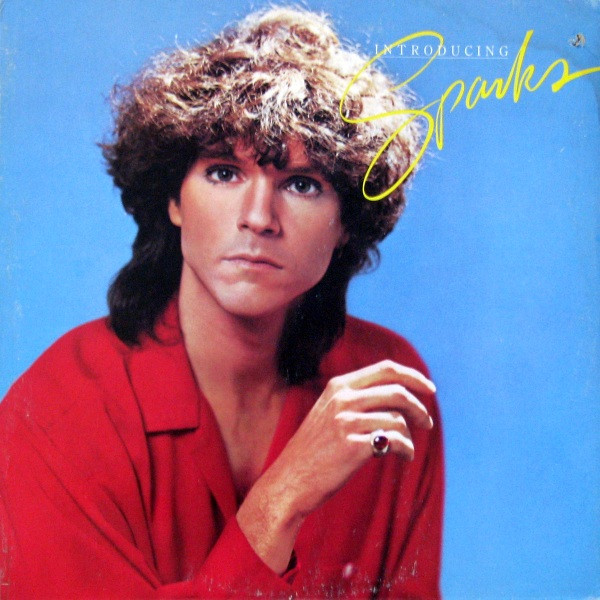
With “Big Beat” deemed a failure, Sparks attempted a different style of pop rock for their seventh studio album; “Introducing Sparks”. Introducing did away with the band from Big Beat and the general sound and switched to studio musicians like Ed Greene and Toto bassist Mike Porcaro.
Track one is “A Big Surprise” but the biggest surprise is how bland and mainstream sounding it is. **½. Track two is “Occupation” has tongue firmly embedded in cheek as it runs through various jobs and pros and cons of them, while adding that you don’t need one if your dad’s rich. This is fun and surprisingly good. ***¾. Track three, “Ladies”, worried me a bit. Ron’s lyrics have been bordering on misogyny at times, but this is just fluff. ***. Track four, “I’m Not”, is a song about not being arsed about anything. There are elements of manic depression about it. **¾. Track five, “Forever Young”, has a pleasant enough melody but lyrically it’s very repetitive. ***¼.
Over to side B and track six; “Goofing Off”, a tribute to the weekend. For a band who have never really worked 9-5 jobs they’ve managed to perfectly incapsulate what getting two days off work is like. ***½. Track seven is “Girls on the Brain” and this feels like what Sparks were aiming for on Big Beat. It has a nice mixture of Ron’s wacky lyrics, Russ’ vocals and a driving backing band. It’s just a lot slower than anything on Big Beat and maybe that’s the secret. ***¾. Track eight, “Over the Summer”, feels like it dropped off a Beach Boys album until Russ’ lyrics kick in, but the backing vocals are still very Beach Boys. It’s good, but somewhat unexpected. ***½. We conclude with “Those Mysteries”, a song about asking questions and why your dad doesn’t know the answer. It’s bizarrely done in the style of a ballad. ***.
Introducing Sparks is a lot better than I was expecting. There are some genuinely decent tracks on here. It got panned and has horrible reviews but it’s way better than Big Beat or Indiscreet.
Album #8: No. 1 in Heaven (1979)
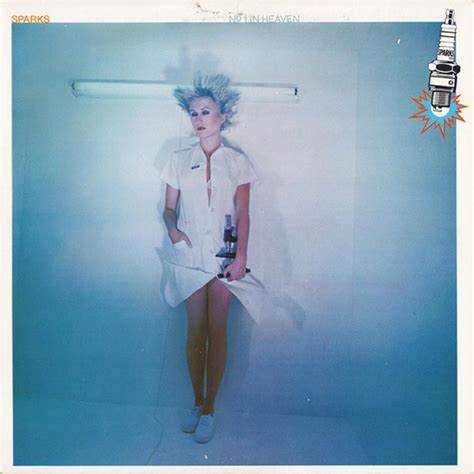
Unsatisfied with experimental sounds on Big Beat and Introducing Sparks, the band went off in a new and different direction on “No. 1 in Heaven” making an electronica album before the 1980s. With aspects of synth-pop and disco, the album set the pace for the 1980s crossover from disco to synth records. They teamed up with Munich based producer Giorgio Moroder, the “Father of Disco”. While the album wasn’t well received on release, they had a hit single here and influenced Joy Division in the process. “The Number One Song in Heaven” sounds suspiciously similar to the backing on “Love Will Tear Us Apart”, one of the finest songs ever written.
We start with track one; “Tryouts for the Human Race” and my god, does this sound different. It’s Euro-disco driven and makes the most of both Mael’s. The use of synth allows Ron Mael to explore his keyboards and Russell’s vocals are more suited to ethereal dance pop sounds. It’s astonishing how fresh this sounds after Introducing Sparks. ****. Track two; “Academy Award Performance”, has an incredible BPM. It’s so fast. It’s not as clean and clinical as the opener but it’s still intense. ***½. Track three is “La Dolce Vita”, presumably named after the Fellini film of the same name as both Mael brothers were interested in arthouse cinema, especially New Wave. The ‘Golddiggers’ chorus is awful but the rest of the track bangs. ***¾.
“Mira, Mira guys, there’s Lira in her eyes, La Dolce Vita”
We flip over after three songs for track four; “Beat the Clock”, a song about the rapidity of life. It does scream ‘comedy glam rock band makes a disco single’. Russ’ vocals are just about perfect for this. ****. Track five is “My Other Voice” is mainly an instrumental. It feels like Ron Mael pissing about with synths and I’m surprised it made the album, but it does improve when Russ’ heavenly vocals kick in. ***. Finally, track six is “The Number One Song in Heaven”, the first Sparks hit since “Looks, Looks, Looks” four years earlier. It’s heavily experimental, weird, repetitive and is definitive Sparks. ****½.
I was dreading Sparks’ switch to electronic music but it’s like they found their sound. While I enjoyed a lot of Sparks’ work as glam rockers and experimental rockers, they’re actually synth-pop boys and I couldn’t be happier for them. This is a great album. It’s all killer, no filler.
Album #9: Terminal Jive (1980)
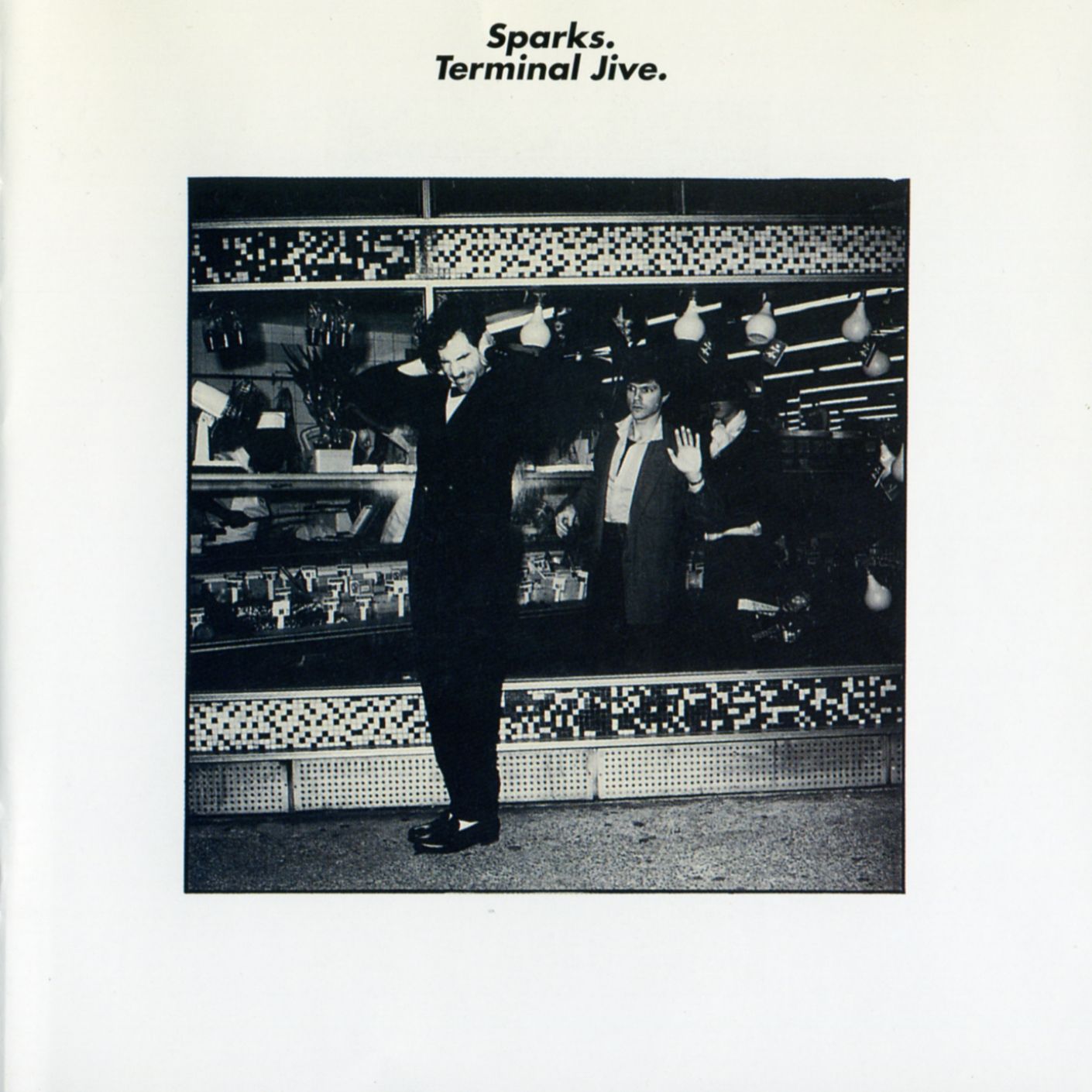
Never ones to rest on their laurels, Sparks went back into the studio with Giogio Moroder and also Harold Faltermeyer (Yeah, the Axel F guy). This time instead of doing a repeat of their successful synth-pop they switched it up and combined synth with the traditional band of their earlier years thus resulting in a new wave album of disco-rock or DOR (dance-oriented rock). It was a sound that inspired Duran Duran, INXS, Eurythmics, New Order and Depeche Mode. The most DOR song is “Don’t You Want Me” by Human League, which came out in 1981. Sparks, again, ahead of their time.
Terminal Jive wasn’t even released in America but produced hit singles in France and Australia. Track one, “When I’m With You”, has that disco-rock sound but it also retains the strangeness and uncomfortable-around-women lyrics that Sparks were known for. ****. Track two is “Just Because You Love Me” and if you told me this was on the Flashdance soundtrack I’d believe it. I can imagine this playing on the car radio in “Licence to Drive”. It’s SO 80s. ***½. Track three is “Rock N’ Roll People in a Disco World”, which about sums up the band’s approach to music. Having said all that in the title there are basically no other lyrics in the entire 4m48s of the song. **½. Track four is an instrumental version of “When I’m With You”, which is as disappointing as it is uncreative. *
Over to side B and we have track five; “Young Girls”. Oh, jesus fucking christ. Why are they so weird about women? This is the worst so far. DUD. Track six is “Noisy Boys”, which was co-written by Harold Faltermeyer and it sounds like it. I don’t know if this was intended to be anthemic but it’s a swing and a miss. It’s certainly catchy, I’ll give them that ***¼. Track seven is “Stereo”, co-written by disco daddy himself Giorgio Moroder. It’s surprising how flat it is. **½. We finish on track eight; “The Greatest Show on Earth”, which is more like the previous album and synth driven. Of course, it’s a creepy song about women but it does land. ***¾.
Album #10: Whomp That Sucker (1981)
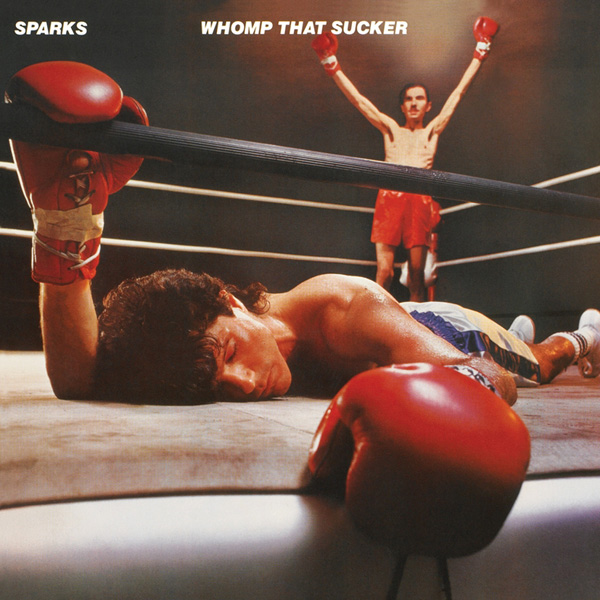
The band stayed with Giorgio Moroder for their third collaboration but this time using Reinhold Mack as producer. Whomp That Sucker is a return to rock after two disco influenced albums. Although still very much sat in the New Wave section of your record store. The new band for this included Bob Haag (guitars), Leslie Bohem (bass) and David Kendrick (drums) collectively known as Bates Motel and later Gleaming Spires. In the US, this was the first album from Sparks to chart since Indiscreet.
Track one is “Tips for Teens” and opens with the incredible lyric of “I’ve got a snapshot of your Aunt Maureen, she’s 90 and you’re a teen”. It’s a comedy song but it’s a jaunty little rock song. ****. Track two, “Funny Face”, was a single in France whereas “Tips for Teens” was released in other markets. “Funny Face” is another self-depreciating song from Ron Mael where he hates his looks. I watched the music video, it’s fucking weird. ***¼. Track three is “Where’s My Girl?” a plea to get the singer’s missing girlfriend back. ***. Track four, “Upstairs”, is about the stuff that’s cluttered up your brain. That’s where this concept to listen to every Sparks album came from. I’m not sure if I love or hate Upstairs. ***½. Track five is “I Married a Martian”, a bizarre combination of sci-fi and the complexity of relationships. ***¼.
Flipping over we have track six; “The Willys”, which is utterly weird. I’m not I can even do it justice in print. ***½. Track seven is “Don’t Shoot Me”, a protest song about hunting from the point of view of a rhinoceros. ***½. Track eight is “Suzie Safety”, a song about not staring into the sun and looking both ways before you cross the road that turns into a love story. **. Track nine is “That’s Not Nastassia”. I like the pianos on this, but the repetitive lyrics grind at me. **¾. Whomp That Sucker rounds out with track ten; “Wacky Women”. Yet another creepy Sparks song about women. *
This is a backwards step creatively. It seems weird they made such a good dance/synth album and then just went back to the same weird sounding rock songs they made beforehand. Tips for Teens is great, but the album feels like a missed opportunity.
Album #11: Angst in My Pants (1982)
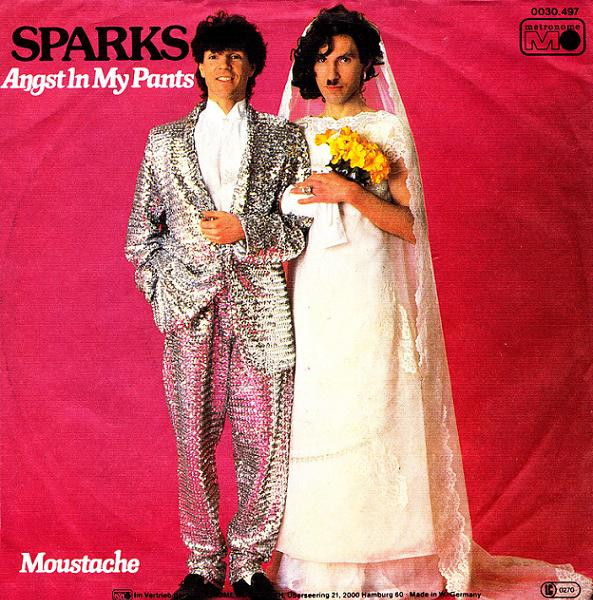
Sticking with Musicland, Moroder’s studio in Munich and the same backing band as the previous album but adding in extra synthesisers thanks to James Goodwin. “I Predict” was a minor hit for Sparks in the USA, charting on the US Hot 100. As a result, their music was featured in the film Valley Girl, and they appeared on Saturday Night Live.
Track one is “Angst in my Pants”, the first time they’ve recorded a title track. It’s weird and repetitive so it fits. **½. Track two is “I Predict”, which was the hit single. The lyrics are so bizarre for a mainstream rock song with Russell predicting “they’re gonna find out the Queen is a man”, “Lassie will prove that Elvis and her had a fleeting affair”. The video features Ron Mael, in drag, doing a striptease. This is MAD, I love it. ****½.
“And this song will fade out (I predict)”
Track three is “Sextown USA”, which is surprisingly not a perverted song about young girls. ***¼. Track four is “Sherlock Holmes”, which starts out as a tribute to the world’s greatest detective but somehow degenerates into a love song. It will never cease to amaze me how Sparks find their way into a love song. ***. Track five is “Nicotina”, a song about craving a cigarette. It’s a banger. ***¾. Track six is “Mickey Mouse”, which the band played on SNL and apparently Ron Mael deadpanned a monologue about mice beforehand. It’s fucking weird, as you’d expect. ***½.
Flipping over we’ve got track seven, “Moustache”, an ode to upper lip hair, the one thing man has over women. This is very Ron Mael territory. “When I trimmed it very small my Jewish friends would never call”. ***¾. Track eight is “Instant Weight Loss”, a bizarre ditty about being called “fats” and promptly losing weight. ***¼. Track nine is “Tarzan and Jane”, which is a song about a school rebellion where the kids take over the classroom and kick the teacher, “Miss Prune”, out. ***¾. Track ten is the “Decline and Fall of Me”, a dissection of the band’s success rate. “Chart position, bubbling under, drowning. And goodbye future Mrs. Mael”. ***¾. We finish on track twelve; “Eaten by the Monster of Love”. This is a repetitive, and weird, show closer. ***½.
Angst in my Pants in probably my third favourite Sparks album (after the obvious ones). While “Whomp That Sucker” felt like a missed opportunity, Angst in my Pants is so clean, clinical, funny and well put together that there’s no internal voice crying out for a synth-pop record. This is just good, all-American, weird as shit fun time.
Album #12: In Outer Space (1983)
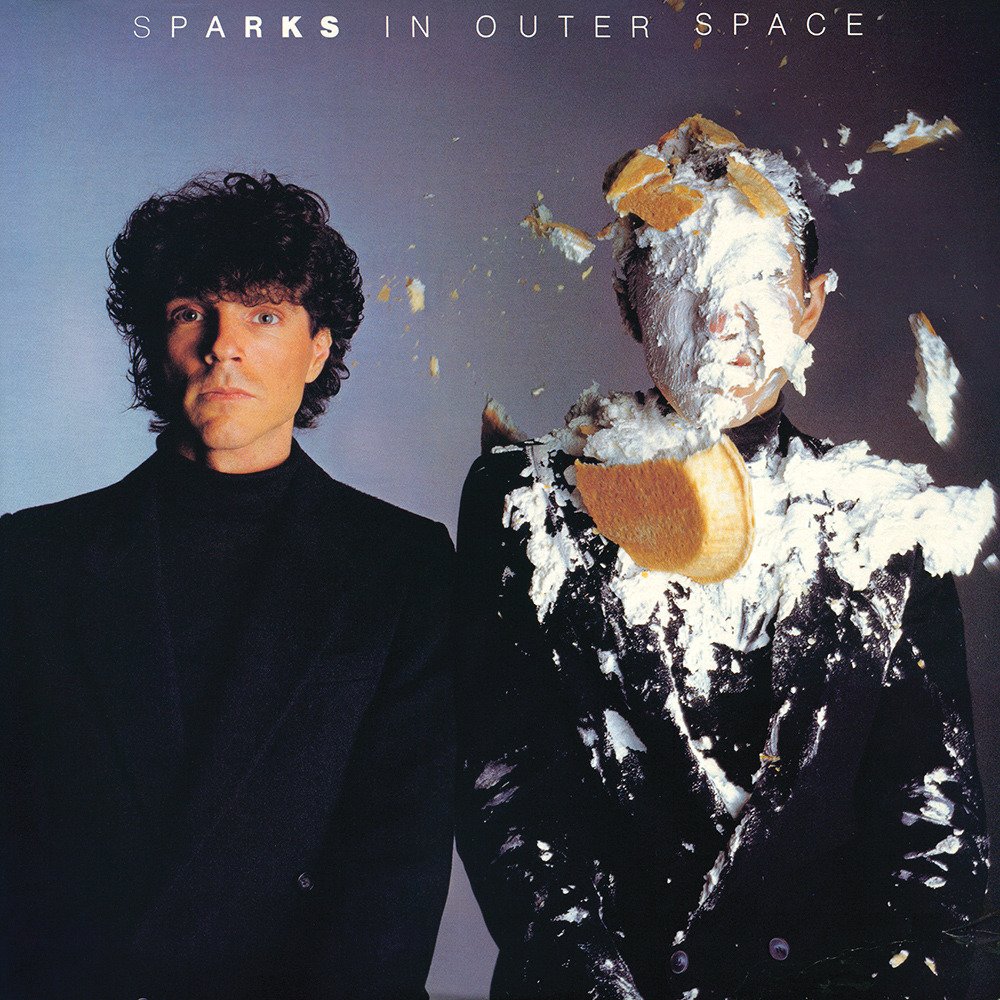
Recorded in Belgium, this marked the first album Sparks produced themselves and it turned out to be quite successful with the single “Cool Places” making it to #49 on the Billboard Hot 100. The song was a duet with Jane Wiedlin (who had a hit single later called “Rush Hour”, you probably know it, and was Joan of Arc in Bill & Ted’s Excellent Adventure) from the Go-Go’s (Berlinda Carlisle’s band before she went solo) and the band gained fans from the team up. The album made it to #88 on the Billboard 200.
Track one is “Cool Places”, the duet with Jane Wiedlin. I love Jane Wiedlin. This is so dorky though. Vocally, I really liked having a second vocal line in there and it worked. ***¾. Track two is “Popularity” and it’s clear this album has a lot more synth than the last two. This is another super dorky song about being popular. **¾. Track three is “Prayin’ for a Party”, which sounds like Van Halen selling out or some weird fucking Christian rock track. It’s so odd. ***. From Christian rock to track four, “All You Ever Think About is Sex”. The song details various acts of coitus in public. This is the album where Ron Mael is hit with a banana crème pie on the cover, and he takes a few pelters in the video for this while Russell dances like a nerd. ***½. Track five is “Please, Baby, Please”. Another ode from Ronald Mael to the females of the species to not treat him like shit. After a decade of this, you’d think one would have done. Not good for the music though is it? ***.
We flip over to side two with track six; “Rockin’ Girls”. I dread any Sparks’ song with girls in the title. In this one they constantly sing about being attracted to a 17-year-old girl called Linda Lou. I don’t know how much more I can take of this, although it does sound like a story about two teenage lovers rather than a dude in his 30s talking about a 17-year-old. I do love the “you’re the only girl I ever met who hates “Hey Jude” lyric. *½. Track seven is “I Wish I Looked a Little Better”, which is another Ron Mael writing crutch; self-depreciation. ***¾. Track eight is “Lucky Me, Lucky You”, the other song Jane Wiedlin provided vocals for on this album. It’s a song about a couple getting marooned on an island. It’s sweet and I wish they’d done more songs with Jane. ***¾. Track nine is “A Fun Bunch of Guys from Outer Space”. This song is exactly what it says on the tin. It’s simplistic and repetitive. **½. We round the album out with “Dance Godammit”. It has the same level of childish simplicity the rest of the album has. **½
As a concept they went with ‘alien from space makes computer music’. It’s not their best work. The duets both work, despite the simplistic lyrical content. “I Wish I Looked a Little Better” is a hidden gem but in general this is a forgettable album compared to Sparks’ best work. Scope out the Jane Wiedlin stuff though.
Album #13: Pulling Rabbits Out of a Hat (1984)
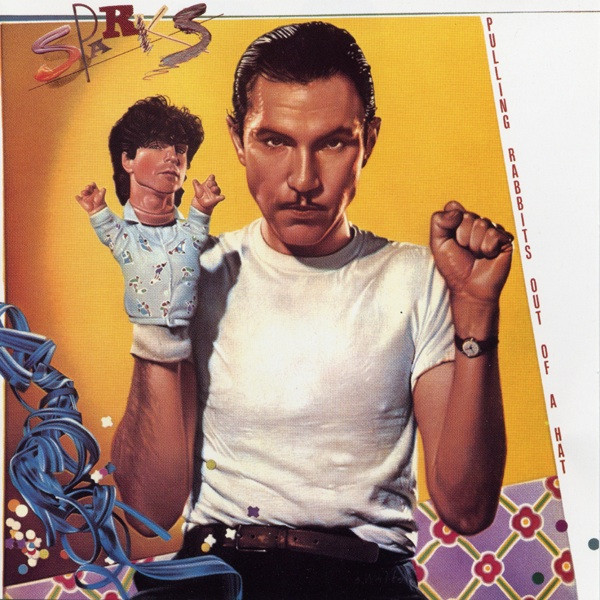
I looked at the Ranker for Sparks’ albums and this is dead last. While “In Outer Space” didn’t wow me, it was commercially successful. This was not. The single “With All My Might” did get some love on the dance music/club play chart. Tonally this is a bit darker than the childish “In Outer Space” so at least it’s got that going for it.
Track one is the title track “Pulling Rabbits out of a Hat”, a song about being a magician, which may be a metaphor for releasing music. It’s not great. **¼. Track two is “Love Scenes”, a song about seducing your co-star on a film to make the sex scenes more realistic. The most criminal thing about this song is that it’s just boring and overproduced. **. Track three is “Pretending to be Drunk”, which is at least more upbeat. It sounds like a synth heavy country song, intended for radio play. ***½. Track four is “Progress”, a song from the point of view of a new car. **½. Track five is “With All My Might”. This is a very soft synth-pop song. I absolutely fucking hate it. There’s nothing sneaky in the lyrics, it’s just bad. This didn’t even get mentioned on the Sparks Brothers documentary, which should speak volumes considering how much depth they went into on that. DUD.
We head onto side two for track six “Everybody Move”. It’s a song about dancing or something. It’s shit. ½*. Track seven is “A Song That Sings Itself”. Creatively this album has really struggled but this is a slight improvement. There’s a lyric here that goes; “we think we own the world and own the stars and yet in fact we barely own our cars”. **½. Track eight is “Sisters”. I think this is a song about lesbianism, but I could be wrong. It’s not great musically and in general this album has been very simple. From a band that likes to experiment, this is disappointing. **¼. Track nine is “Kiss Me Quick” and at least this feels like it comes from the heart. “Lips that taste like cigarettes and California wine”. Only the second song I’ve liked on this album. ***¼. Track ten is “Sparks in the Dark (Part Two). Part one was just before “Everybody Move” but is a short instrumental not worth mentioning. This isn’t much better, although it has more interesting music than most of the album, which is a bit damning. **¾.
Well. Easily Sparks worst album. If they make another album this bad, ever, I’ll be both shocked and appalled. Piss poor. Avoid.
Album #14: Music That You Can Dance To (1986)
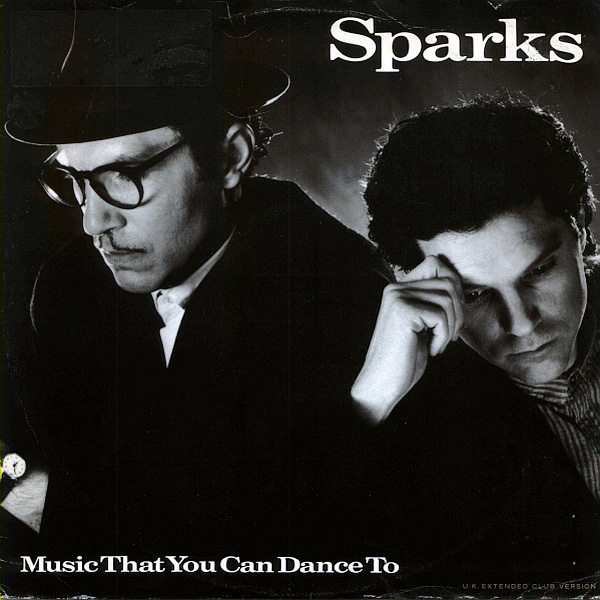
We return to dance music here for the first time since “No. 1 in Heaven”. This marks the final album for the crew Sparks had been working with since 1981. Drummer David Kendrick would go on to join Devo and the Mael brothers would record their next album as a duo.
Track one is “Music That You Can Dance To” reminds me why I loved “No. 1 in Heaven”. It’s such a good fit for the keyboards, synthesisers and Russell Mael’s vocals. Lyrically this is a bit simplistic, but you can dance to it. ****. Track two is “Rosebud”, a Citizen Kane inspired slice of cheese. It’s very much a ballad and not a dance song, which is a bit odd. As is Russell’s monologue about one word not being enough to sum up a life, apart from in the movies. ***. Track three, “Fingertips”, is a cover of a song from the early 1960s made by a 12-year-old Stevie Wonder. Russell’s vocals work well here and it’s a funky tune. I’d like to see them explore this avenue more. ***½. Track four is “Change”, which is a bizarre Europop style song with a chorus about ‘every dog having his day’. They probably go too heavy on the percussion, but I really like this. ****¼.
Over to side two with track five “The Scene”. This is another shot at an anthemic dancefloor filler, and it doesn’t work. It’s too long and ambles between verses with experimental keyboards. It feels long. **¾. Track six is the “Shopping Mall of Love” and features Ron Mael’s vocals, which is to say he speaks lines into the microphone in between offensive amounts of drum machine, with Russ doing backing vocals. I did not like this. *½. Track seven is “Modesty Plays”, a new version of an older song that didn’t make it onto an album. I assume this is supposed to sound like “Modesty Blaise”, like the wacky 60s film of the same name, which is also weird and therefore up Sparks alleyway. ***½. Finally, track eight is “Let’s Get Funky”, which I thought was going to stink based on the title. I was right! This album has light-hearted pop songs on it and experimental bullshit with too much percussion and weird synth. This is the latter. *¾.
Music That You Can Dance To is very hit and miss. Change, Music That You Can Dance To, Modesty Plays and Fingertips are all very good. Everything else is bad. An album of contrasts, for sure. The highs, for me, outweigh the lows. Although half this eight-track album is a waste of time. You should definitely listen to the other half.
Album #15: Interior Design (1988)
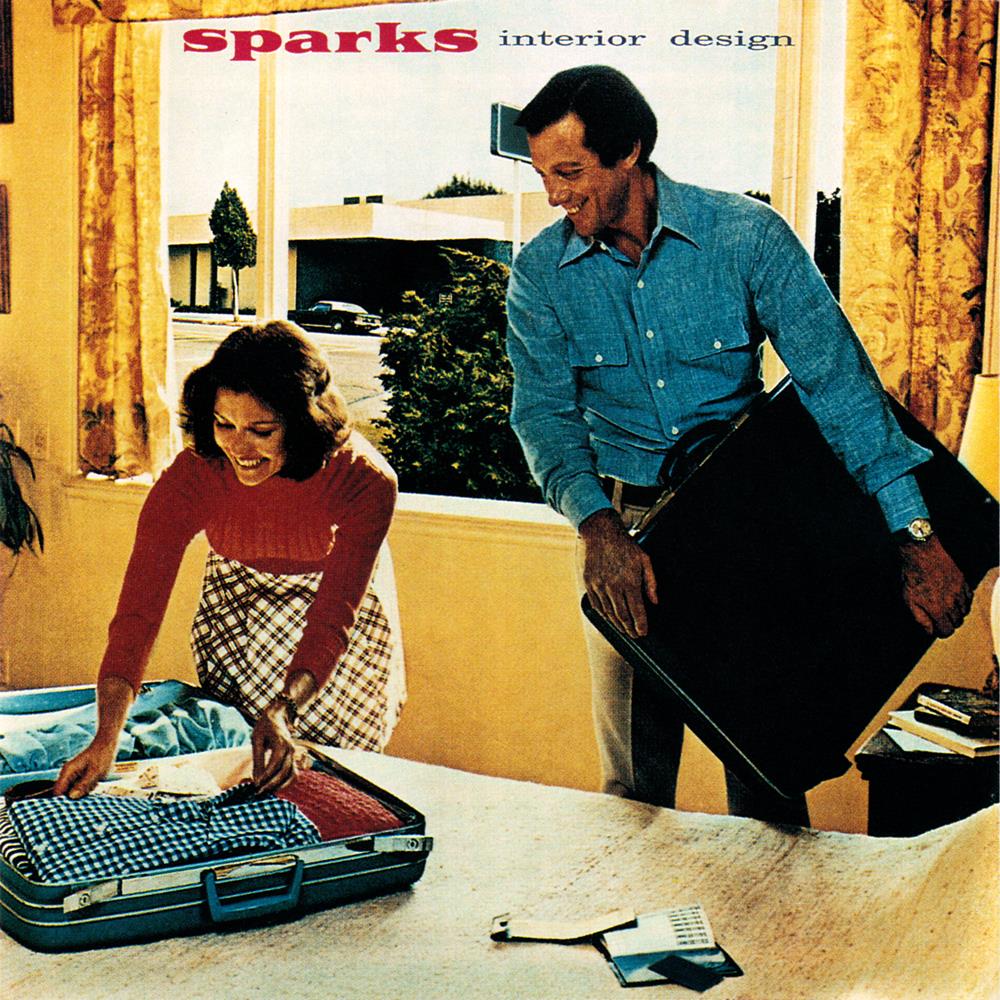
Sparks dumped their backing band before recording Interior Design and after recording it disappeared for 6 years to work on a Tim Burton film, which never saw the light of day. They didn’t even tour Interior Design. For recording they used Spencer Sircombe on guitars, John Thomas on keyboards and Pamela Stonebrooke provided backing vocals. This is the final album that was released on vinyl and when Sparks returned it was to the world of compact disc.
Track one is “So Important”, which was released as a single. The music video is horribly aged because of awful SFX. Ron bizarrely shredding a guitar in the video, although he didn’t play that part. Vocally this is naff but it’s well constructed, so bonus points. ***¼. Track two, “Just Got Back from Heaven” was also released as a single. Again, it’s slickly produced but there’s not much going on. **¾. Track three, “Lots of Reasons”, is another weird Ron Mael song about chasing a woman who isn’t interested. Musically, this isn’t very good either. **¼. Track four is “You Got a Hold of My Heart”, yet another song about relationships. Sparks don’t generally make good ballads, and this is another of those. **. Next up is “Love-O-Rama”, which sounds like a less good version of the Scene. There’s also a reference to Roman Polanski, so there’s that. **½.
We flip over for “The Toughest Girl in Town” as the parade of love songs continues. This is obsessed with ‘romantic’ synthesisers. It’s overly produced, and Russ’ vocals are almost lost. “She’s not evil, she’s just a little confused” is a decent lyric but there’s not enough lyrically to push it higher. ***. Track seven is “Let’s Make Love”, a sappy ballad. Russell doesn’t have the voice for this, and Ron doesn’t have the lyrics to convey love like he does pain. *½. Track eight is “Stop Me If You’ve Heard This Before”. This is a song about your girlfriend cheating on you. The overreliance on lousy keyboard compositions and that fucking drum machine continue unabated. **. Track nine is “A Walk Down Memory Lane”. Lyrically this is the most playful song on the album. We said, “Hey, where’s our champagne? And they gave us a gun”. ***¼. We end on track ten, “Madonna”, which is an imagined encounter with the famous pop singer. The verses are spoken by Russell Mael and would have been good…if they weren’t spoken. It’s quite a funny track but the spoken word gimmick tanks it. **¾.
Ho boy. I thought Sparks would bottom out with Pulling Rabbits Out of a Hat. I was wrong. Interior Design is their worst album. Most of the songs are lyrically poor, with Ron suddenly obsessed with writing balladlike love songs, something he’s really bad at. Add this to the use of twin synths on just about every track and the drum machine from hell. The whole album is a miss. When Sparks disappeared for six years, I bet everyone thought they were done and based on this, they were. Creatively this is a huge failure. It’s just bizarre for them to put out another great dance album and fall back into this pop synth trash.
Album #16: Gratuitous Sax & Senseless Violins (1994)
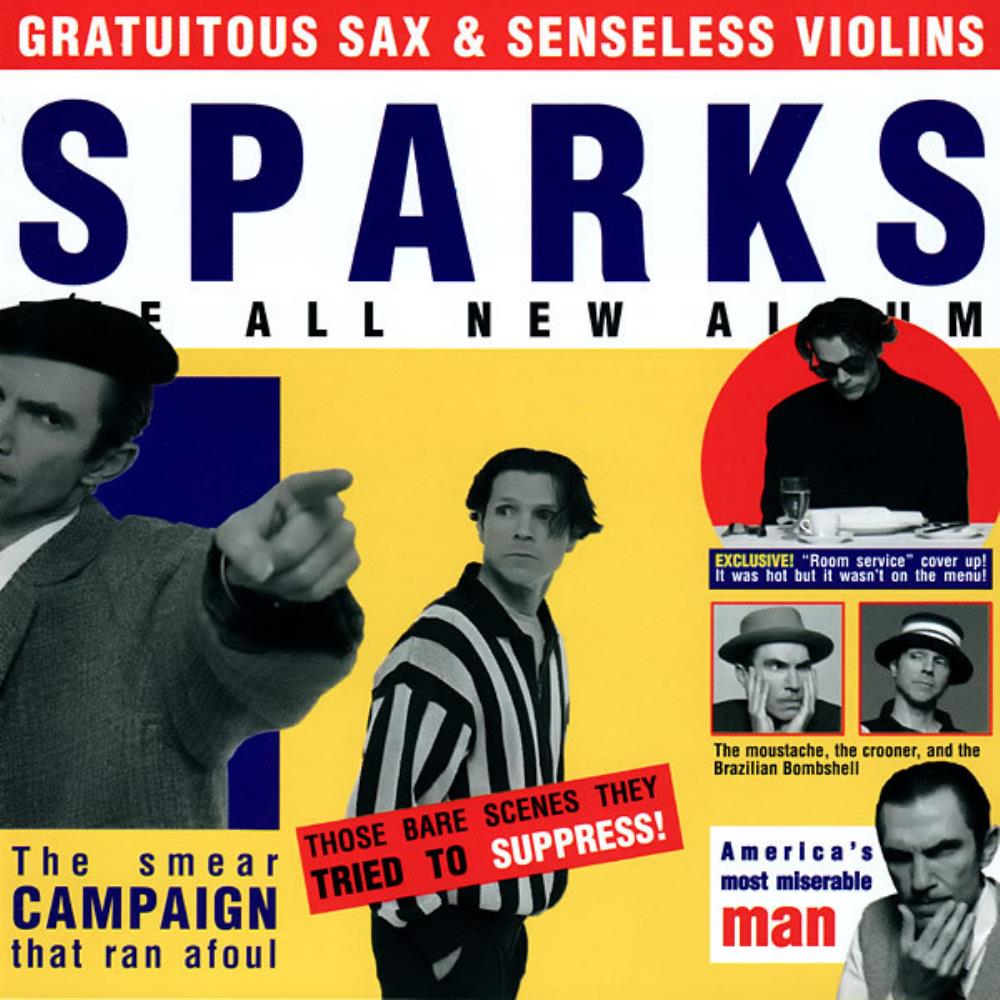
After spending six years trying to get “Mai, The Psychic Girl”, a Japanese manga series, made into a film, Sparks returned in 1994. They never stopped working those six years. They were in the studio every day, working. Nine new songs and a chance for Sparks to reinvent themselves once more.
Track one is “When Do I Get to Sing My Way”, an EDM anthem to struggling in the music business. There’s something magical about it. A proper soul searcher. There’s more truth in the title of the song than in most pop stars entire careers. The underlying message is Ron’s frustration at sitting in the shadows while someone else gets the plaudits. ****¼. Track two is “(When I Kiss You) I Hear Charlie Parker Playing”, which is a complete change of gears. Russell raps! Lyrics are fired at you like jabs in a boxing match. ****. Track three is “Frankly, Scarlett, I Don’t Give a Damn”, a clear reference to “Gone with the Wind”, and the song is basically the plot to the film with Russell playing Clark Gable’s character. It’s a bit clumsy. **½. Track four is “I Thought I Told You to Wait in the Car”, an ode to being married to a far more successful woman. ***.
It’s at this point I discover that any dance song fits the GIF of Molly Ringwald dancing in the Breakfast Club. Enjoy!
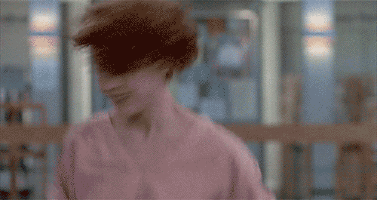
Track five is “Hear No Evil, See No Evil, Speak No Evil”, which is a song about famous lovers of suspect rulers (Bill Clinton, Chairman Mao and Julius Caesar). It’s a slow one, too slow for Molly. ***. Track six is “Now That I Own the BBC”. Molly can dance to this. ***¼. Apparently, they wanted to record different versions for different countries, but it proved to be too much work and, according to Ron, “nothing rhymes with RTL”. Track seven is “Tsui Hark”, the director they tried to get to work on “Mai, the Psychic Girl”, and features Tsui Hark listing his films while synthesisers play in the background. I love it. ***½. Track eight is the “Ghost of Liberace”. “Sometimes he blinds the drivers with his shiny suits”. This is a very weird song, even weirder than Tsui Hark reading out his film titles. Again, it’s great. ***¾. Track nine is “Let’s Go Surfing”. Molly can dance to this. ***½.
There’s no doubt Sparks are better at dance music than rock. They just fit better into the potential weirdness of dance. The Eurobeats on offer here connected with Germans and the album was a big hit there. The two main singles also hit in the UK and USA. A first since the 70s. It’s definitely a successful comeback, in spite of a few misfires, and the high of “When Do I Get to Sing My Way” and “(When I Kiss You) I Hear Charlie Parker Playing” are worth the time.
Album #17: Plagiarism (1997)
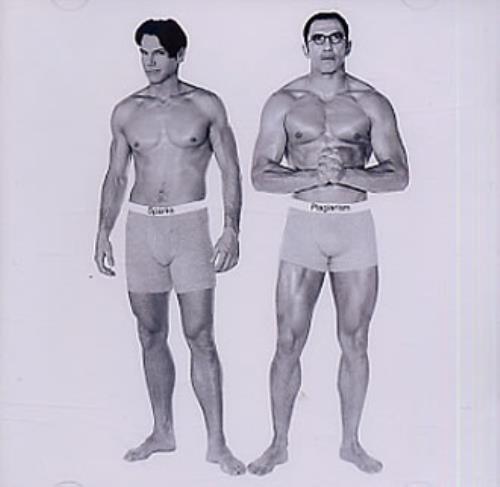
To capitalise on the success of their comeback album, Sparks worked with Faith No More, Jimmy Somerville and Erasure, among others, to record different versions of their most successful work. It was probably envisaged as a Greatest Hits by the record company, but Sparks wanted to do that differently. So, it’s a whole album of remastered, rejigged songs.
We start with a new version of “Pulling Rabbits out of a Hat”, which is completely different to the original. This may shock you, but it’s way better. ***¼. The use of strings especially helps what was a lyrically mid song. Track two is an updated “This Town Ain’t Big Enough for the Both of Us”. This also has a lot of added strings and it’s less effective. ***¾. Still a banger but made far worse in the reworking. Track three is “Number One Song in Heaven (Part Two)”. This is a speeded-up version of “Number One Song in Heaven”. It’s so fast. Molly can’t dance to it! ***½. Track four is “Funny Face”, which originally had a great baseline, but they’ve tried to turn it into a dance song, but they’ve left the guitar in? It sucks. *. Track five is “When Do I Get to Sing My Way”, which only came out 3 years ago! It has extra frills and spills, and it’s not enhanced it. ***½. It feels like George Lucas adding bits to Star Wars and ruining it. Track six is “Angst in my Pants”, which I didn’t like to begin with, and I like it even less now with a disco beat over it. *½.
Track seven is “Change”, which they’ve slowed right down and put in some wind instruments. It’s fucking awful. *. Track eight, “Popularity”, was another song I didn’t like to start with. Sticking a dance beat over it doesn’t help the lyrics. *½. Track nine is “Something for the Girl with Everything” from way back in 1974. They’ve taken all the guitar out and replaced it with violins. **½. Track ten is the collaboration with Faith No More on “This Town Ain’t Big Enough for the Both of Us”. Mike Patton’s attempts to ‘sing’ alongside Russell expose him as a vocalist and Faith No More were at a creative nadir, releasing the dreadful Album of the Year in 1997. **. Track eleven is “Beat the Clock” and Sparks produce a more synth-heavy version of the song. It’s still good so we’ll call that a win. Although it’s not as good as the original. ***½. Track twelve, “Big Brass Ring”, is an original song and a four-minute instrumental. I am starting to tire of this whole experiment at this point. **.
Track thirteen is “Amateur Hour”, one of my favourite early Sparks’ songs. This has been synthesised to death, sadly. ***. Track fourteen is “Propaganda” is turned into a weird choral song with three vocalists and no instruments. Although it’s odd, I appreciate the innovation. ***¼. Track fifteen is a dance version of “When I’m With You”, again one of Sparks’ better songs. The music doesn’t rush in after the chorus like it did originally. The synthesisers don’t give it enough depth. ***½. Track sixteen is “Something for the Girl with Everything”, again, this time with added Faith No More. At least FNM provide something different on an album that has replaced so many guitars with synthesisers. ***¼. Track seventeen is “The Number One Song in Heaven” featuring Jimmy Somerville. Replacing Russ’ vocal with Somerville makes this at least different but reminds me how good Russ’ vocal was originally. It’s also slower with more strings, which seems to be Sparks answer to everything on this album. ***½. We end on “Never Turn Your Back on Mother Earth”, which has had all the guitars stripped out and replaced with violins. Quelle surprise. It still works but it’s less effective. ***.
A bizarre experience; listening to rehashed versions of Sparks’ songs, by the band themselves, and almost without exception the tracks have been made worse. Staggering, really. What frustrates me the most about “Plagiarism” is the lack of innovation. They just took their own songs and played violins over them while removing the backing band. I’m shocked that a creative force, like the Mael brothers, would make something so limp. No wonder it bombed. Sparks’ 1994 comeback album feels a long way off what they did here. A huge disappointment and one of Sparks’ worst albums.
Album #18: Balls (2000)
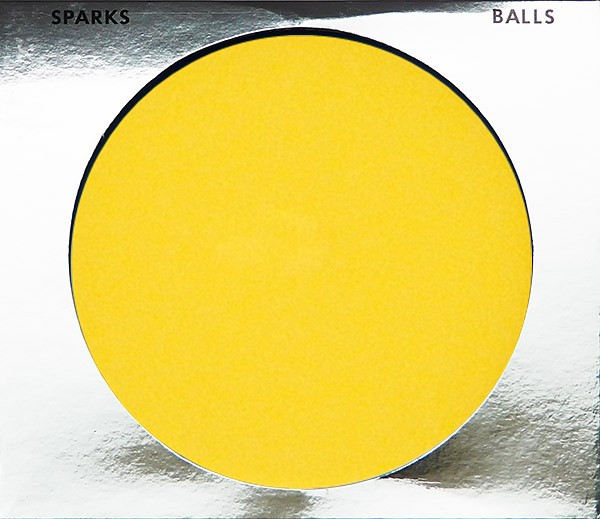
Balls was Sparks’ attempt to make a harder dance sound, more in line with the Prodigy, Chemical Brothers and Fatboy Slim and what was popular at the time. Balls coincided with that bubble bursting. Prodigy effectively went on hiatus in 1999. Sparks had planned to make two albums in this style but ditched an already written follow up album and went in a different direction.
Track one is “Balls”, which suffers from the insistence at letting Russell dominate the song vocally, leaving the Prodigy-lite beats hanging around in the background. Part of the appeal of the Prodigy was that Keith had to scream to be heard over the pounding rhythms with beats crashing through on the mix. They try that here and it doesn’t work. **¾. Track two is “More Than a Sex Machine”, which sounds more like New Wave minus the band. Lyrically, it’s fine. ***. Track three is “Scheherazade”, named for the character in Arabian Nights. Which is a fucked-up story of a King whose wife cheats on him so he marries a virgin every day and has her beheaded the next day so she can’t cheat on him. The result being the 1001 stories in Arabian Nights as Scheherazade started a new story every night and the king didn’t behead her because he wanted to hear the end of the story. The song is told from the POV of the king. ***¼. Track four is “Aeroflot”, a love song to the Russian airline. This is typical Sparks’ weirdness and I appreciate it. ***½. Track five is “The Calm Before the Storm”, which was the first single to be released from the album. The mix and the use of synthesisers are better here than on other tracks but still not blowing me away compared to some of the earlier dance tracks they put out. ***½.
Track six is “How to Get Your Ass Kicked”, which is a weird little ballad about various ways you can get beaten up. Although none of it makes sense. It’s just so weird. **½. Track seven is “Bullet Train”, another ode to transport along the lines of Aeroflot but with a faster beat, probably designed as a dance floor filler. The synth stuff is bad on this track. **¼. Track eight is “It’s a Knockoff”, which was written for the Tsui Hark/JCVD movie “Knock Off” as the band had become friendly with Hark during the attempt to make “Mai, The Psychic Girl”. Apparently “Knock Off” is great fun, it’s one of the few big Tsui Hark films I’ve not seen. The song? Is lyrically fine but the use of synth is disappointing. **¾. Track nine is “Irreplaceable”, which leads heavily with piano before the various synths kick in. The production is good, but the song is forgettable. ***. Track ten is “It’s Educational”. By this point, it’s clear the overall ‘sound’ of the album is a bust. It’s Sparks trying to be something they’re not, which is cool because they’re prepared to try different things but they’re not the Prodigy and don’t have the depth of sound of replicate what the Prodigy do. They do have some nice backing vocals here but it’s not enough. **¼. We end the album with “The Angels”, yet another slow song. It’s bizarre to put out a dance album with so many ballads on it. Especially with them clearly aiming for a harder sound. **¾.
What a bizarre experience Balls is. They started out attempting to ape the Prodigy but ended up so far off the assignment that I don’t even know what this album is? A couple of the tracks are decent, but the second half of the album just falls off a cliff. Sparks comeback has been bizarre. It started so well with Gratuitous Sax & Senseless Violins, but Plagiarism and Balls are both huge misses.
Album #19: Lil’ Beethoven (2002)
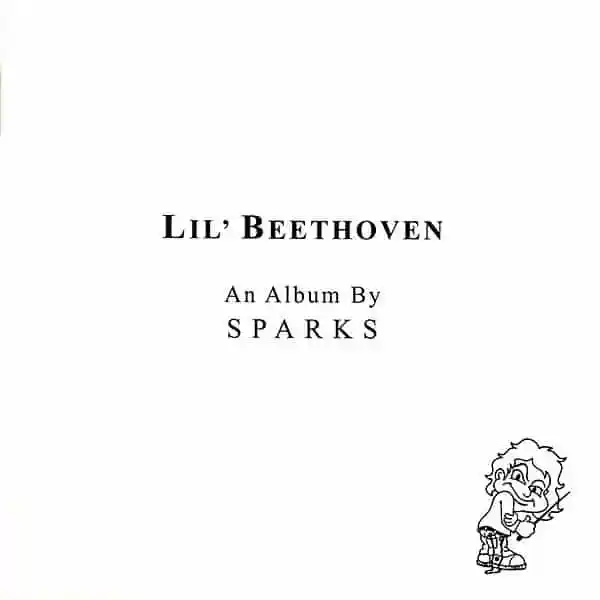
The one positive about Plagiarism and Balls was there was clearly a new sound hiding away in there. The Mael brothers had become interested in orchestral music and in particular strings. The switch in approach resulted in “Lil’ Beethoven”, a neo-classical/chamber-pop album.
Track one is “The Rhythm Thief”, a literal explanation of how they’d stolen the beats and replaced them with dense orchestral noise. It’s the kind of depth I was complaining about a lack of on “Balls”. The use of violins is far more aggressive, and the vocals don’t overwhelm but rather sit in between the peaks of the strings. ****¼. Track two is “How Do I Get to Carnegie Hall?” This is the start of Sparks’ extremely repetitive lyrics on this album. ***½. Track three is “What Are All These Bands So Angry About?”, which came a few years after the peak of Limp Bizkit, Korn etc. Slipknot were on the up around this time too. This is another highly repetitive song lyrically. ***½. Track four is “I Married Myself”, which is closer to glam rock than anything else on the album both lyrically and vocally. Unlike previous attempts at genre warping ballads, this works. ***¾. Track five is “Ride ‘Em Cowboy”, which heavily features harpsichord (presumably?) and creates a very different sound and alternates with pianos in the background. ***¾.
Track six is “My Baby’s Taking Me Home”, which is a famous Sparks’ song as it only contains the title lyrics but the meaning changes as Russell’s tone changes. A fine exercise in minimalism. ****¼. Track seven is “Your Call’s Very Important to Us, Please Hold”. This is another exercise in repetition but instead of a change in tone throughout, it’s deliberately very boring and repetitive, designed to reflect the frustration of call waiting. The way Russell sings in between shows how he’s getting more annoyed. ***½. Track eight, “Ugly Guys with Beautiful Girls” is an assessment of how riches change the perception of unattractive people. The song has rock elements and an actual bassline. There’s a heavy influence on lyrics rather than vocals and Russell speaks most of the song. ***¼. We conclude with “Suburban Homeboy”, a criticism of white youths from the richer areas pretending to be inner city hoodlums. It’s a bit silly done in a jaunty rhythm to mock the rich. ***¼.
“I am a suburban homeboy
With a suburban ‘ho right by my side
She’s known as Miss Missy Tannenbaum
And she’s one freak bitch, ain’t no lie”
Lil’ Beethoven is a definite return to form for Sparks. It’s completely different to their other work, even if some of their comedy influences start to creep back into towards the conclusion. “My Baby’s Taking Me Home” is a prime example of how they went stylistically on Lil’ Beethoven. The repetitive lyrics, the solid base for the song. Whereas “The Rhythm Thief” is a statement song, outlining their intentions ahead. You could argue both are the crown jewels of Lil’ Beethoven.
Album #20: Hello Young Lovers (2006)
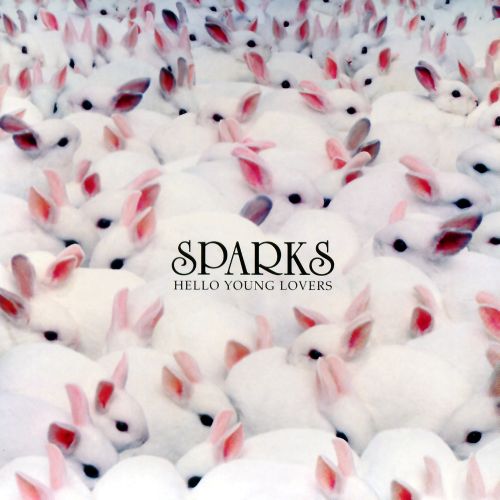
Having discovered a new orchestral sound on “Lil Beethoven” Sparks spent four years on the follow up, a concept album on modern love. I’m already dreading it. Having dispensed with guitars and drums on their previous release they must have felt guilty and brought both back for this album.
Track one is called “Dick Around”, which the BBC refused to play because it had “dick” in the title. This starts out orchestral before the band kicks in and it’s one of the band’s heavier sounding tracks with crunching guitars, which offsets the angelic vocals. It’s obviously very strange. I think I really like it? ****. Track two is “Perfume”. It’s a song about wanting to be with a girl because she doesn’t wear perfume. ***¼. Track three is “the Very Next Fight”, which leads with Russell talking. I’m not keen on him speaking lyrics. Here they have Russell do a load of choral speaking and then singing over the top of it. Technically, it’s impressive but I don’t like it. **¼. Track four is “(Baby, Baby) Can I Invade Your Country”. The lyrics are the same as the American National Anthem. So, that’s where we’re going with this. I like how subversive it is but again I don’t like the decision to reduce Russell’s lyrical contribution to speaking the lyrics. **¾.
Track five is “Rock, Rock, Rock”. This is much the same. The overall vibe of this album doesn’t agree with me at all. Russell speaking his lyrics doesn’t work for me at all. *. Track six is “Metaphor”. Lyrically, by the way, there’s nothing wrong with this album and I quite like the construction of most of the songs, but the vocals are just bad. Same again here. *½. Track seven is “Waterproof” and Russell is finally back to singing. It happens to coincide with one of the least interesting arrangements on the album and he goes back to speaking lyrics anyway. *½. Track eight is “Here Kitty” and they insert irritating meows in the background. It’s about cats getting stuck in trees. *. Track nine is “There’s No Such Thing as Aliens” and I’ve just had enough of the album at this point. Musically this is ok, and I like the self-harmonising that Russell does. I’m just sick of the sound of the album by this point. **¾. Final track is “As I Sit Down to Play the Organ at the Notre Dame Cathedral”. This is more of the same but it’s seven minutes long. *.
I don’t know what it was about Hello Young Lovers that really rubbed me up the wrong way. I’m pretty sure it’s the vocals. Russell’s vocals are often used as an instrument in the arrangement of Sparks’ records, and they try and test the limits of it here but in the wrong way. Instead of pushing it up, they’re pushing it down. He speaks a lot of the lyrics and rarely gets to let loose. I found this album particularly hard to listen to because I didn’t like the sound and it just repeats itself after the first couple of songs. “Dick Around” is a clear stand-out track and they never really push that clash of guitars and vocals again during the entire album. There were strange choices here and I respect the commitment to doing something different this one didn’t land for me. It is a frustratingly well produced album, but I just don’t like the content.
It’s at this point that I take a lengthy break from the project. Knowing you have to listen to another six albums by a band after listening to an album of theirs that you don’t like at all is somewhat daunting. Let’s see if Sparks turn it around with…
Album #21: Exotic Creatures of the Deep (2008)
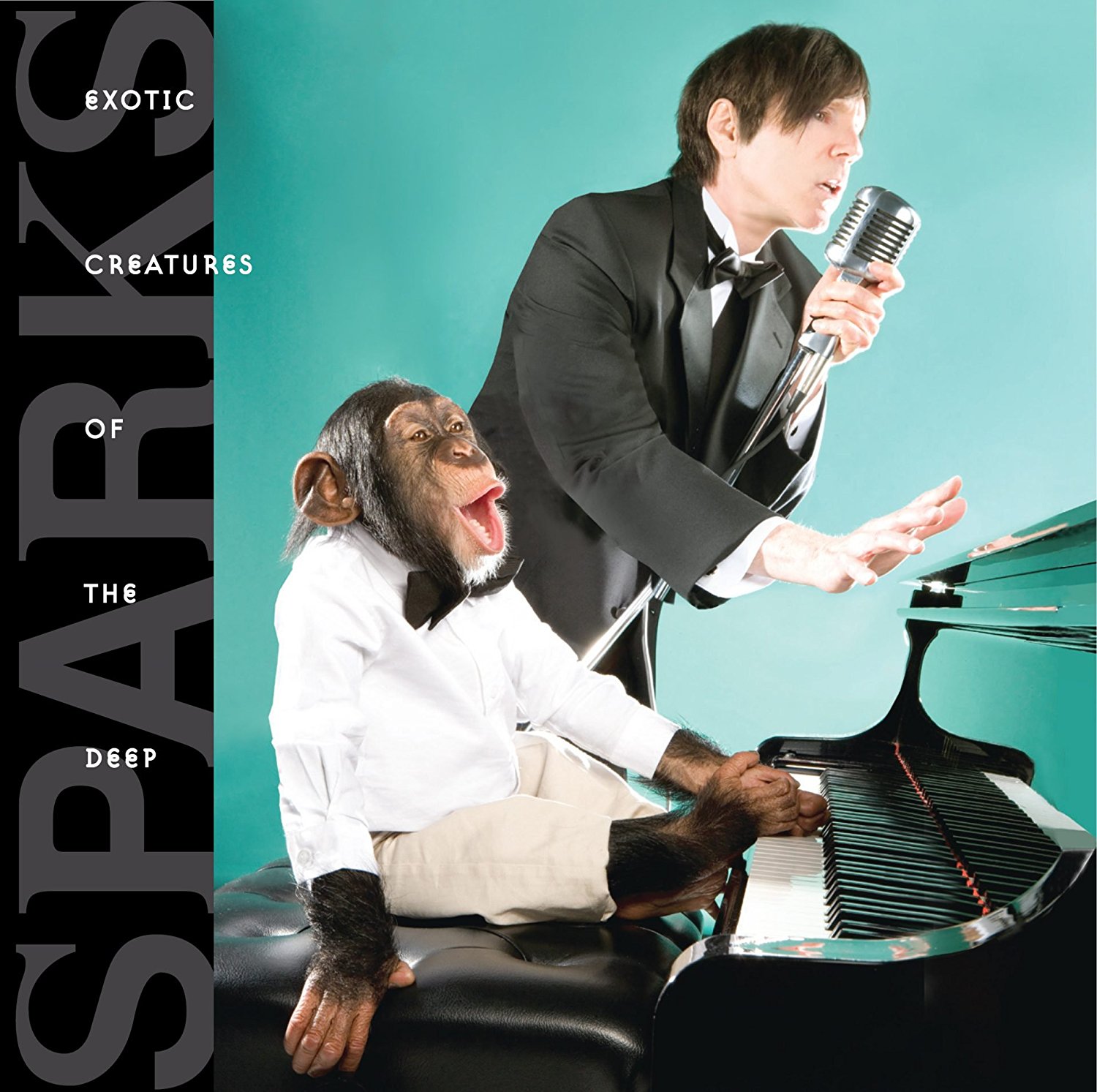
This is the album where they toured it by playing 20 nights at Islington Academy, doing each of their 20 albums in chronological order. That sounds like an absolute nightmare for the band. It was enough for drummer Tammy Glover who left the band in 2009, to be replaced by Steven Nistor, whose first album was the Seduction of Ingmar Bergman.
They kick things off here with a minute long “Intro”. Most of which is accompanied by a low background hum that’s replaced by piano towards the end. It’s quite pleasing but doesn’t really qualify as a song. Track two is “Good Morning”, which served as the opening single as well. It’s got a bouncy pop vibe to it with Russell bringing falsetto vocals and Ron’s lyrics refer to a drunken one-night stand. “I hope it’s just your laugh that is infectious” tickled me. A great start to the album and a huge improvement over the last one already. ****. (I’m reminded that the last album had “Dick Around”, which was great, let’s not get carried away). Track three “Strange Animal” has a delightful switch of gears for the chorus saving a somewhat plodding approach to the rest of the song. ***¼. Track four is the fantastically titled “I Can’t Believe That You Would Fall for All the Crap in This Song”. It takes the band back to their glam rock early days but with their more modern love of repetitive lyrics and a lovely bit of synth in the mix. ****. Track five is the, also, fantastically titled “Let the Monkey Drive”. I’m not convinced the titular monkey is an actual monkey, but it’s not specifically explored. ***½.
After a brief “Intro Reprise” we get track seven “I’ve Never Been High”. Again, lyrically this isn’t as obvious as it first seems. It’s not a song about drugs but rather lost love. Can someone just give Ron Mael a hug? **¾. Track eight is the confusingly titled “(She Got Me) Pregnant”. This is a gender bending suggestion that woman can be as bad as men when it comes to using and abusing their significant others. Again, a hug for Ron please. **½. Track nine is “Lighten Up, Morrissey”. This was the second single and it’s got a slightly harder guitar-based edge to it. I really like this song with the Mael’s comparing themselves, unfavourably, to Morrissey. Ordering a steak and getting called a murderer is one highlight. ****. Track ten is “This is the Renaissance”. The very word “renaissance” seems to fit perfectly into Russell’s mouth. It just comes tumbling out so sweetly. Highlights here including debating the pronunciation of the title word. ***½. Track eleven is “The Director Never Yelled ‘Cut’”. This is a weird song with Russell being largely monotone but also falsetto while Ron plinky-plonkies along in the background. **½. Track twelve is “Photoshop”. A criticism of photographic manipulation. It’s a good enough statement but it rumbles on about a minute too long. Also, they rhyme hell with hell, twice. ***½. We conclude with “Likeable”. This attempts to be an epic conclusion to the album, running at 6m13s. Rather surprisingly it has a number of verses and isn’t just repetitive lyrics. ***¼.
While it doesn’t have a stand-out banger, Exotic Creatures of the Deep is a strong album with a lack of clunkers that have ruined a few more modern releases. It’s consistently good.
Album #22: The Seduction of Ingmar Bergman (2009)
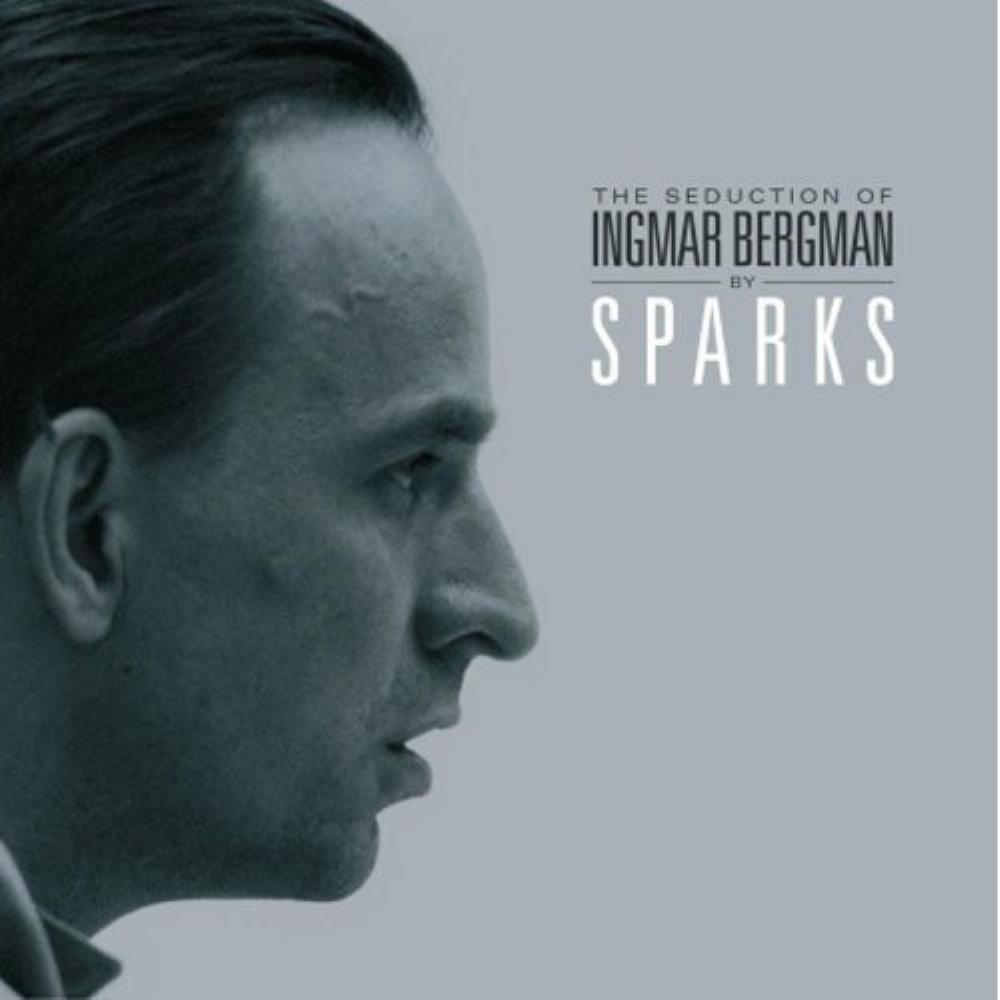
Commissioned by Swedish national radio, this is a concept album and was recorded in English and Swedish. It concerns famous Swedish film director Ingmar Bergman, best known for the Seventh Seal (the one where the dude plays chess with Death), Persona, the Virgin Spring, Scenes from a Marriage, Autumn Sonata and Wild Strawberries. Bergman himself never worked in the USA but considered it after his arrest for tax evasion in 1976. “The Seduction of Ingmar Bergman” is Sparks’ re-imagining of his career, where he’s enticed to work in Hollywood.
We start at the 1956 Cannes Film Festival where Bergman won an award for ‘poetic humour’. Jonas Malmsjo voices Bergman and in track two he introduces himself and the ‘strange events’ that took place after Cannes ‘56. Most of the tracks detail Bergman’s journey into the depths of Hollywood rather than being stand-alone songs. On arrival in LA, he’s greeted by a limo driver, played by Ron Mael. The piano drives the scenes, speeding up as the vehicle he’s in goes faster. Russell provides narration via the medium of song. Russell also plays the studio chief, belting out greetings in falsetto tones. His lyrics translated into Swedish in spoken word by Saskia Husberg so Bergman can follow what’s occurring. Turning an introductory meeting into “Mr Bergman, How Are You?” creates the first real banger on the album. ***¾. It feels weird to rate all the songs as most of them link stuff together.
After his meeting with the studio chief, Bergman is driven to his hotel by Ron Mael. In his room Bergman is literally seduced by the “Hollywood Welcoming Committee”, which is a hooker, basically, voiced by Tammy Glover. Tammy was Sparks drummer around this time before leaving the band after this album to form Thorcraft Cobra. Glover is now head of production for TNT and TBS. We head back to the studio and in “The Studio Commissary” Sparks go through the slate of the studio’s talent at the time. I’m particularly pleased with the Alfred Hitchcock lines. ***½. Bergman monologues after this about the possibilities of using Hollywood’s money to finance his projects, before he fantasises about American actors being useless and being chided by a ‘Hollywood starlet’ voiced by Rebecca Sjowall.
As Bergman’s imaginary Hollywood experience begins to spiral out of control as he’s harassed by tourists and autograph seekers. As it all begins to fall apart Bergman ponders escape. Part of the overall issue with “The Seduction of Ingmar Bergman” isn’t the storytelling, which is good, but rather the lack of big musical numbers. Everything flows into the next moment. One of the better examples of musicality is “We’ve Got to Turn Him Round” with the studio chief getting miffed about Bergman’s rejection of Hollywood ideals. ***¼. Musically the album gets complex as Bergman attempts to escape. Bringing in dense techno sound with big orchestral drama on top. All while Bergman runs through his thoughts. Eventually realising he’s now a performer in a Hollywood action film that he so despises.
Elin Klinga appears after the escape as Greta Garbo in a track named, fantastically, “Garbo Sings”. Garbo, Swedish legend who made it big in the USA in the silent era, is Bergman’s saviour. Garbo retired in her thirties, going out on the top. Bergman goes to a cinema with Garbo and watches one of her earlier films, from Sweden, which breaks the Hollywood spell and when he emerges from the theatre he’s back in Sweden and the nightmare is over.
The Seduction of Ingmar Bergman is to be consumed as a whole. It’s 1h 4m in the company of two storytelling brothers, imagining what it would have been like for Ingmar Bergman to get seduced by Hollywood in the 50s at the start of his career. Sparks are so good at this format it’s surprising this is their first stab at it, although they attempted Mai, the Psychic Girl for six years. While it lacks the top end bangers that define Sparks’ best work, the overarching storyline is wonderfully executed.
Album #23: FFS (2015)
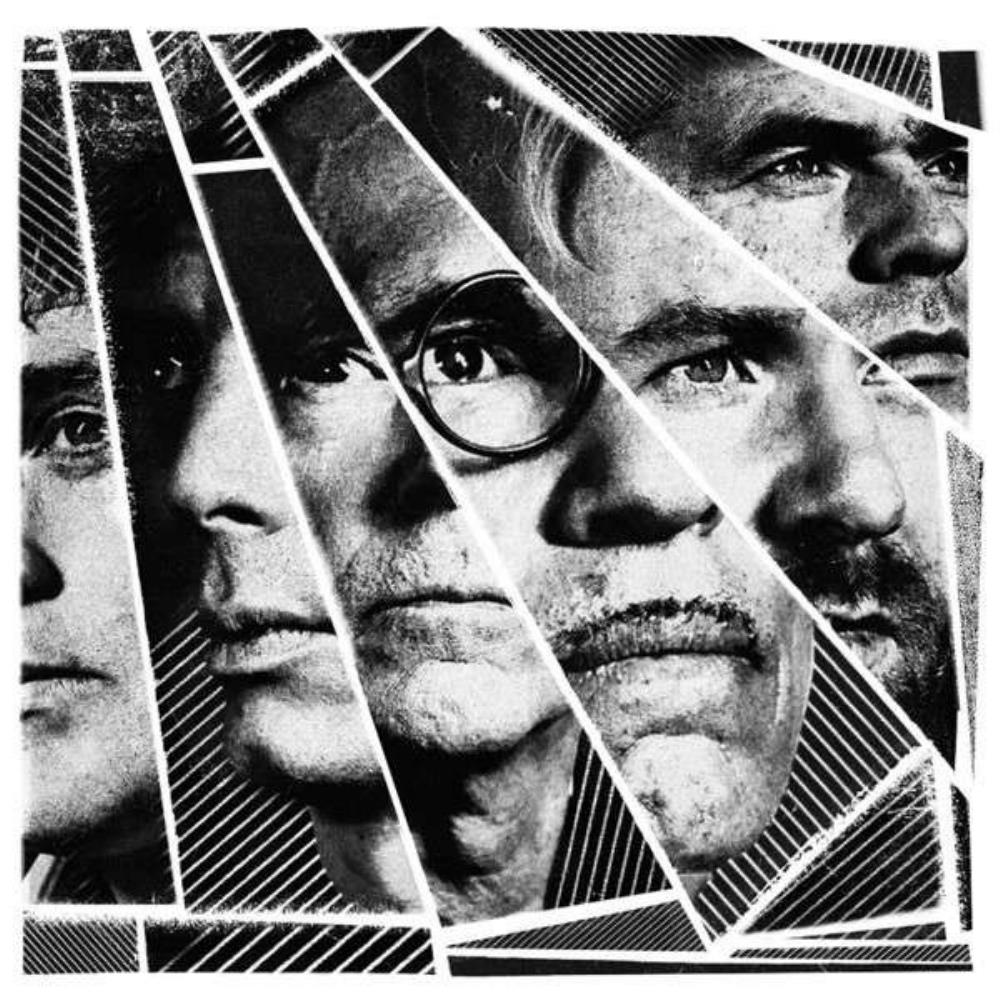
FFS was the unlikely team-up of Sparks with Scottish rockers Franz Ferdinand. Alex Kapranos and the boys had been long-time Sparks fans and jumped at the chance to record with them. They’d attempted an earlier collaboration back in 2004 with demos going backwards and forwards but they couldn’t get together to record. After a chance meeting at Coachella, the two groups got together to record with John Congleton in London. Congleton has worked with a smorgasbord of musicians including Nelly Furtado, Erykah Badu, David Byrne, Marilyn Manson, Lou Bega, Lana del Ray and the Killers.
Track one is “Johnny Delusional”, providing the kind of lyrical weirdness you can expect from Ron Mael, but with a solid backing of an accomplished rock band. The switch in vocals from Russell to Kapranos and back again works. ***½. Track two is “Call Girl”, written by both bands, is a weird electropop tune. It’s not about a hooker but rather a shortened version of “why don’t you call, girl”. It’s evident at this point that the collaboration is a chance for Franz Ferdinand to do more experimental music and it is successful. ***¼. Track three “Dictator’s Son”, an ode to being born into privilege, “in a country that’s banned the rain”. This is trademark Mael weirdness and feels like a Sparks song. ***¾. Track four is “Little Guy from the Suburbs”, which was written entirely by Alex Kapranos. Russell providing backing vocals is the only real sign of Sparks and it’s a bit drab. **¼. Track five is “Police Encounters”, is a bizarre switch in gears. It’s a manic, fast paced song about Harlem. It’s fun and unrelenting. A proper slice of pop rock. ****. Track six is “Save Me from Myself”, a more typical Sparks track but using Kapranos to harmonise in the background. It doesn’t feel like a collaboration at all. **¾.
We head into the second half of the record with track seven “So Desu Ne”. This starts out with the lyric; “she’s a mountaineer of love, she’s climbing Mount Fuji”. A slice of Japanese culture inspired pop rock. ***¾. Track eight is “The Man Without a Tan”. We’re back to full on collaboration here with alternating vocals, harmonisation and a song that feels somewhere between the two bands. A cracker! Shocked to learn this wasn’t even a single. ****. Track nine was co-penned by the Mael’s and Franz Ferdinand keyboardist Nick McCarthy and is called “Things I Won’t Get”. It’s about knowing your limitations in life and trying not to get hung up on understanding string theory. ***. Track ten, “The Power Couple”, is a Mael brothers’ song with their trademark repetitive lyrics. ***. Track eleven is the provocatively entitled “Collaborations Don’t Work”, which was written by both bands and shows the strengths of everyone involved. Unfortunately, there’s a weird slow-down spot in the middle that meanders hopelessly. It’s a shame because the operatic Russell vocals had been winning me over up to that point. The second half of the song is driven by Franz Ferdinand. It’s a clever way of having both cakes and eating the bloody lot. ****. The final song is “Piss Off”, which was penned back in 2004 when the original collaboration was planned. It’s an anthemic track to conclude the album and a jolly good time. ***¾.
Overall FFS was a success. The bands didn’t both manage to get their personalities across during the entire album and it’s a bit strange the best examples come at the back end with “Collaborations Don’t Work” and “Piss Off”. I’d put this up there with some of the better Sparks’ albums because Franz Ferdinand take a touch of the weirdness away and make Sparks more palatable to a mass market. They also provide a solid, reliable backing band for the album. I have it behind “Lil’ Beethoven” and “Gratuitous Sax & Senseless Violins” on their ‘later’ work but ahead of everything else. The album did well and reached #17 on the UK Albums Chart. The supporting live tour included Glastonbury, Lollapalooza, Lowlands, Rock en Seine and appearing on Later…with Jools Holland.
Album #24: Hippopotamus (2017)

Having spent years experimenting with different music types and collaborations with other artists, Sparks returned to their roots in 2017 with a pop rock album. Having had a boost from performing at major UK festivals with Franz Ferdinand the album charted at #7 on the UK Album Chart. Guitarist Dean Menta made his final Sparks appearance on this album, having been with the group since Plagiarism. Menta’s presence represents the longest any other musician had been part of the band.
Track one is “Probably Nothing”, a song about forgetting what you’re doing. It hit hard with me. **½. Track two is “Missionary Position”, a song I was dreading when I saw the track listing. I shouldn’t have doubted. It had me giggling throughout. “It’s a little retro and a bit passe but you know you make her feel A-OK”. It also includes the incredible pun, and drop of the music style; “it ain’t no joke, it ain’t Baroque”. ***¾. Track three is “Edith Piaf (Said It Better Than Me”. The song has an incredible Claymation video attached that reminds me of Tool’s “Sober”, only with charm instead of packed meat. ***½. Track four is “Scandinavian Design”, a loving tribute to Ikea. It also name drops Sam and Dave. It’s a jaunty little pop tune. ***¾. Track five is “Giddy Giddy”, which has more dance elements. I’m guessing they found the word “giddy” funny and went from there. Russell raps! ***½.
Track six is the lyrically savvy “What the Hell is it This Time?”, a criticism of Catholicism and religious people asking for forgiveness. There’s a lovely little jab at football supporters in there with the lyric “if Arsenal wins, he really don’t care” and LIVERPOOL 0 flashes up in the video at that point. I love this band. If the song had a better hook it’d be an all-timer. Lyrically it’s one of my favourite Sparks songs. ****. Track seven is “Unaware”, another lyrical stunner. A complete dissection of modern America. “Taylor Swift has something new, Nike has a brand new shoe, reads your heartrate anywhere”. Musically, the song is a bit drab, but it doesn’t stop it being a winner. ****. Track eight is the titular “Hippopotamus”. This is a song about a hippo appearing in someone’s pool. “How did it get there?” made me burst out laughing. You should listen to this without looking up the lyrics first because it’s gets progressively dafter. This is so fucking weird, I love it. ****½. Track nine is “Bummer”, a song about how boring funerals are. ***½. Track ten is “I Wish You Were Fun”, an ode to someone you like but they’re a bit dull. “You say your favourite colour’s brown” had me chuckling. I think I’ve laughed more at this album than any Sparks release. ***¼.
Track eleven is “So Tell Me Mrs Lincoln Aside from that How Was the Play?” Using Abraham Lincoln’s assassination as a metaphor for a bad date, Sparks bring a lot of their punchy repetitive lyrics here and it’s a solid entry. ***¾. Track twelve is “When You’re a French Director”, which includes spoken words from French director Leos Carax. Among his previous films are Holy Motors, one of the craziest films I’ve seen. The song is both a love letter and critique of French films, with Sparks hired to write the OST for Carax’s, then forthcoming, picture Annette. Track thirteen is the “Amazing Mr Repeat”. It’s got a lot of sporting references that I can’t quite get. ***½. Track fourteen is “A Little Bit Like Fun”. This is a very Sparks song. Extremely repetitive lyrics, no explanation to be found. On an album that’s contained so many lyrical hits, it’s a bit of a disappointment. **¾. We close the album with “Life with the MacBeths”. This features vocals from opera singer Rebecca Sjowall, who worked with the band on the Seduction of Ingmar Bergman. It gives the song a very different feel. It moves the Shakespearean tragedy into modern times and the respective TV ratings. ***½.
At the start of Hippopotamus I was struggling to see the hype for it but the middle section is the most lyrically strong run of songs Sparks have ever done. “What the Hell is it This Time?”, “Unaware” and “Hippopotamus” is a fantastic three track run. It’s an album that isn’t afraid to experiment either with rap, the spoken word of French directors, songs about how satisfying sex is, opera, baroque pop and references to Edith Piaf, Abraham Lincoln and Shakespear along the way. It’s a wild ride and one of Sparks’ most satisfying albums, even if it lacks a musical high point.
Album #25: A Steady Drip, Drip, Drip (2020)
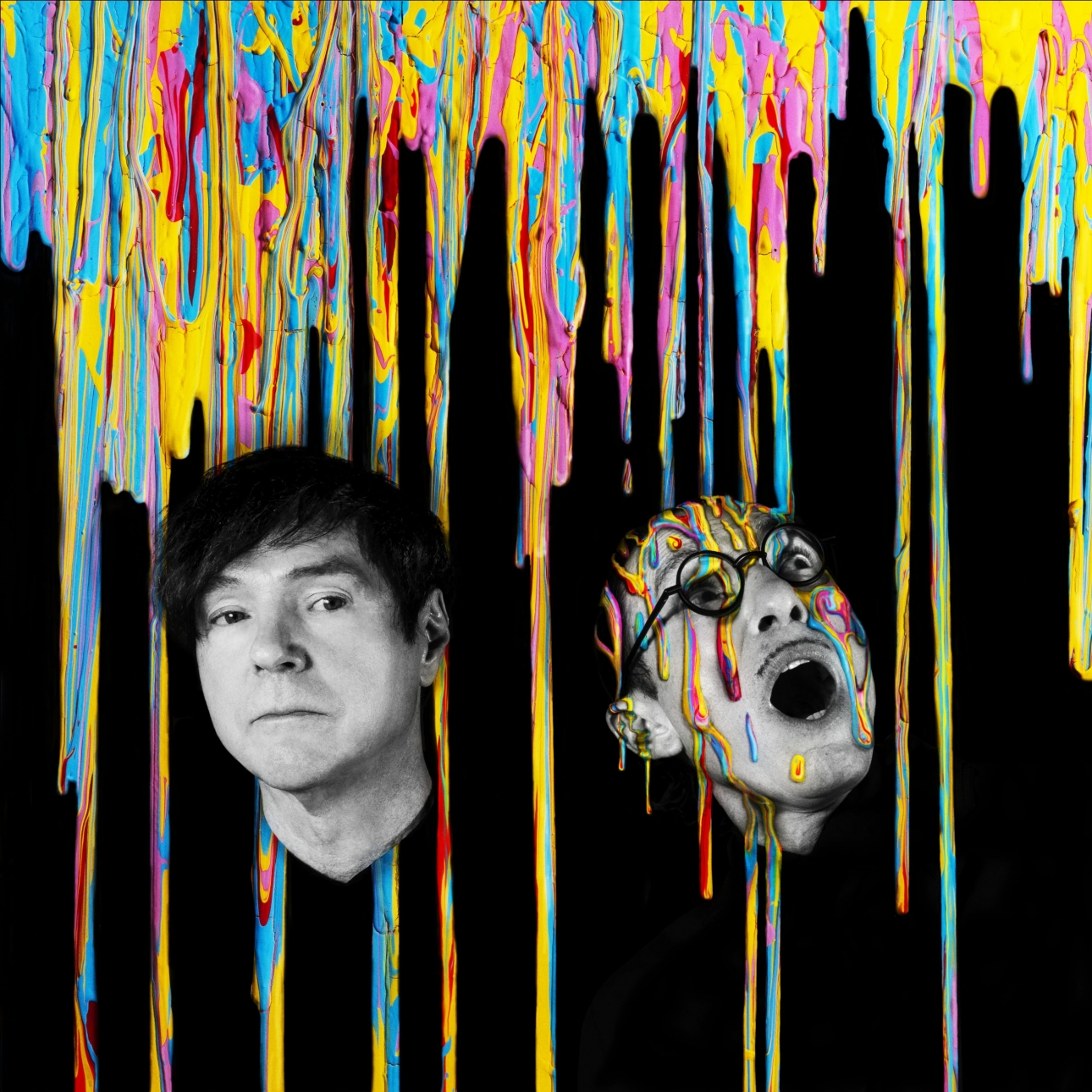
This is the final album I’ll be covering from Sparks. It brings us almost up to date on their career. I’m skipping the Annette OST because I’ve not seen the film yet and I want to watch it first. This is the album that followed the Edgar Wright documentary about the band, which is what set me off on this journey in the first place.
Track one is “All That”. It’s a refreshingly guitar driven song about true love. “Hey, help me out I can’t find my left shoe”. Obviously, it has Sparks somewhat devious leanings but it’s the closest thing to ballad since “With All My Might”. Only it doesn’t feel as phoney as that cash-grab release. Mainly because it also could be about the band. ***½. Track two is “I’m Toast”. I really dislike the use of synthesisers in this. It feels like something they knocked up in a studio without a band. **½. Track three is “Lawnmower”, which the band recorded a video for during lockdown. It starts with Ron Mael talking about the history of the lawnmower. It’s a song about enjoying cutting your own grass, man. ***. Track four is “Sainthood is not in Your Future”, a song about someone thinking a lot of themselves but not actually being a nice person. ***¼. Track five is “Pacific Standard Time”, an ode to California. As with everything so far, the production is polished, but I’m not blown away by the lyrics or the musicality. ***.
Track six is “Stravinsky’s Only Hit” is a typically weird Sparks song about the famous composer. Sparks have these weird inspirational characters. ***¼. Track seven, “Left Out in the Cold”, was a single too. It’s about going to work on an isolated research station and possibly a metaphor for being single. It is quite catchy and an obvious single. ***¾. Track eight is “Self-Effacing”. Self-effacing is about being modest and not blowing your own horn. It’s a very Ron Mael song about regretting not wearing flashier clothes and being the centre of attention. ***½. Track nine is “One for the Ages”, which is another single. It comes with a suitably weird animated video. It’s a song about being a target of middle management abuse, turned into psychotic office killer (I think). Or maybe day-dreaming about being a success. ***¾. Track ten is “Onomato Pia”, a song about an Italian girl moving to the West unable to speak English and making herself known via onomatopoeia. Words what sounds like what they are for the layman, innit (pop, squeak, snap etc). There’s a touch of oompa about the track and the falsetto vocals are in strong evidence. ***½.
Track eleven is “iPhone”, which was another song with a video attached. Here Sparks get SWEARY! The chorus is “put your fucking iPhone down and listen to me”. It’s a criticism of modern technology, consumption and the obsession with social media. ***½. Track twelve is “Existential Threat”, which also has a wacky animated video attached to it. The video is fairly unique as it doesn’t include the Mael brothers. This track fires along at breakneck fashion, layered with paranoia. ****. Track thirteen is “Nothing Travels Faster Than the Speed of Light”. This is an interesting song, from a lyrical perspective, as it tackles people’s opinions and factual truth and how they don’t always agree. There’s a hint of spirituality thrown in but it never bludgeons you over the head. ***½. We conclude our Sparks journey with the song “Please Don’t Fuck Up My World”, an ode to preventing climate change. It’s done so in a bizarre ballad with an orchestra and children’s choir. There’s something unsettling about choral swearing. ***¼.
A Steady Drip, Drip, Drip is a solid effort from Sparks. Visually the album and accompanying videos are engaging and it feels very polished and professional. 14 tracks feels like too many and the album doesn’t start to get good until the midway point. Tracks 7-11 would make a killer EP.
The Ranking:
- Kimono My House (1974)
- No. 1 in Heaven (1979)
- Angst in my Pants (1982)
- Lil’ Beethoven (2002)
- Hippopotamus (2017)
- Gratuitous Sax & Senseless Violins (1994)
- FFS (2015)
- Music That You Can Dance To (1986)
- The Seduction of Ingmar Bergman (2009)
- Exotic Creatures from the Deep (2008)
- A Steady Drip, Drip, Drip (2020)
- Introducing Sparks (1977)
- A Woofer in Tweeter’s Clothing (1972)
- Propaganda (1974)
- Terminal Jive (1980) <—should this be higher?
- In Outer Space (1983)
- Whomp That Sucker (1981)
- Sparks (1971)
- Big Beat (1976)
- Indiscreet (1975)
- Hello Young Lovers (2006)
- Plagiarism (1997)
- Balls (2000)
- Pulling Rabbits Out of a Hat (1984)
- Interior Designs (1988)
Top Songs:
- “This Town Ain’t Big Enough for the Both of Us” (Kimono My House, 1974) 5
- “I Predict” (Angst in my Pants, 1982) 4.5
- “Number One Song in Heaven” (No. 1 in Heaven, 1979)
- “Hippopotamus” (Hippopotamus, 2017)
- “Change” (Music That You Can Dance To, 1986) 4.25
- “When Do I Get to Sing My Way” (Gratuitous Sax & Senseless Violins, 1994)
- “My Baby’s Taking Me Home” (Lil’ Beethoven, 2002)
- “Amateur Hour” (Kimono My House, 1974)
- “The Rhythm Thief” (Lil’ Beethoven, 2002)
- “Tip for Teens” (Whomp that Sucker, 1981)
The 411:
It feels so weird coming to end of this project. I’ve been listening to Sparks songs for months. It’s been a joyous ride through a band that has endlessly evolved and changed. Originally pop rockers in the early 70s before graduating to glam. Kimono My House saw them begin to tamper with prog-rock. Big Beat saw them move into harder New York rock sounds before, in the late 70s, they started making disco and synth music. The Giorgio Moroder produced “No 1. in Heaven” was a complete departure from their previous work. By Terminal Jive in 1980 they’d moved on to new wave. Angst in my Pants saw a blurring of pop, synth and rock. By the mid 80s they were making dance records. After an extended absence in the late 80s, early 90s they came back making house and techno music. Lil Beethoven saw them move on to chamber, art and neo-classical styles, incorporating orchestral backing. With the Seduction of Ingmar Bergman, they made a pop opera and radio musical. They’re a band that constantly evolves. In doing so they’ve made their back catalogue a pleasure to explore and left me wondering who I could possibly cover next….
 Twitter
Twitter